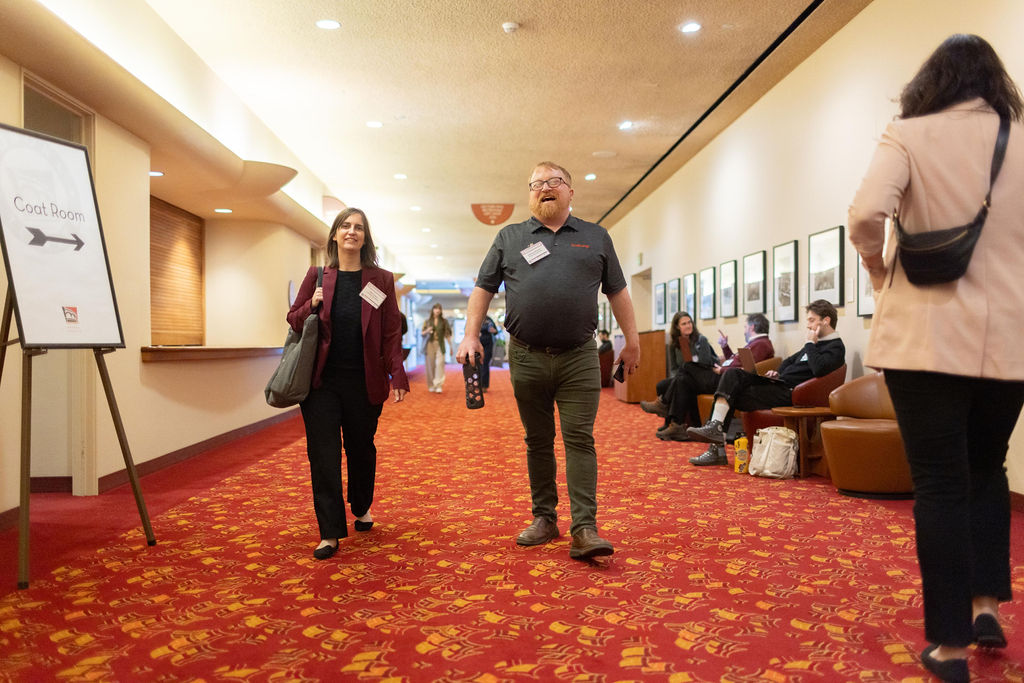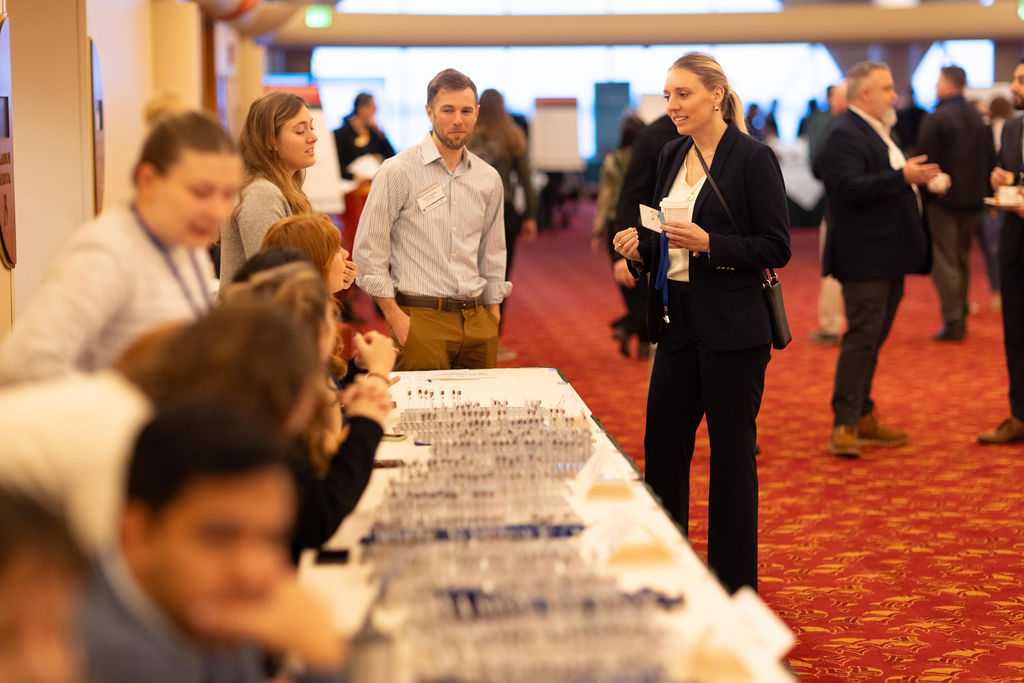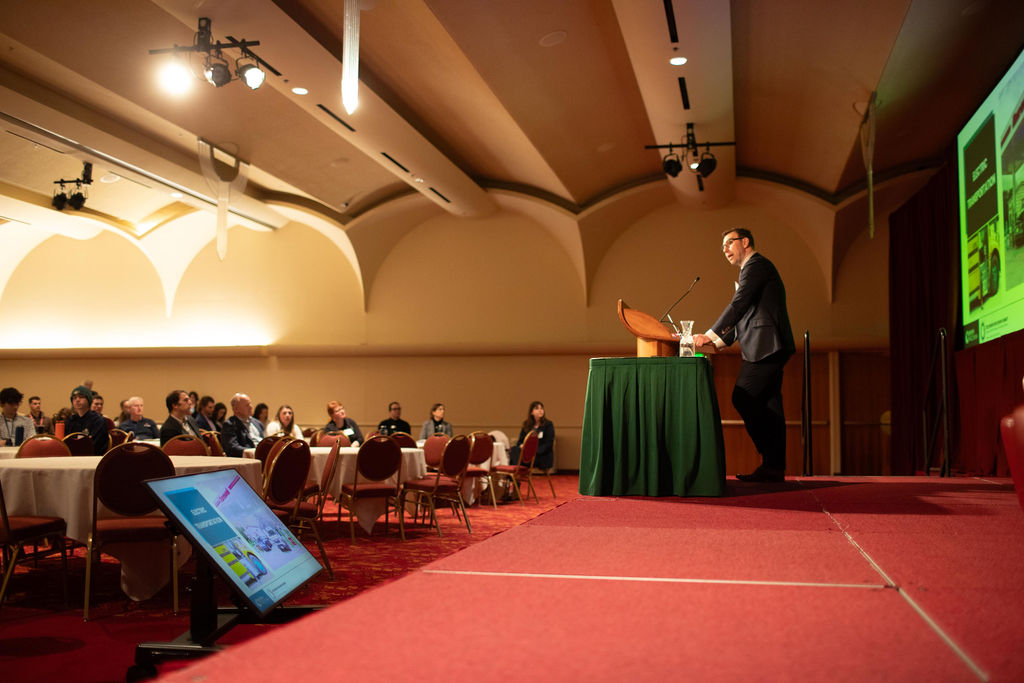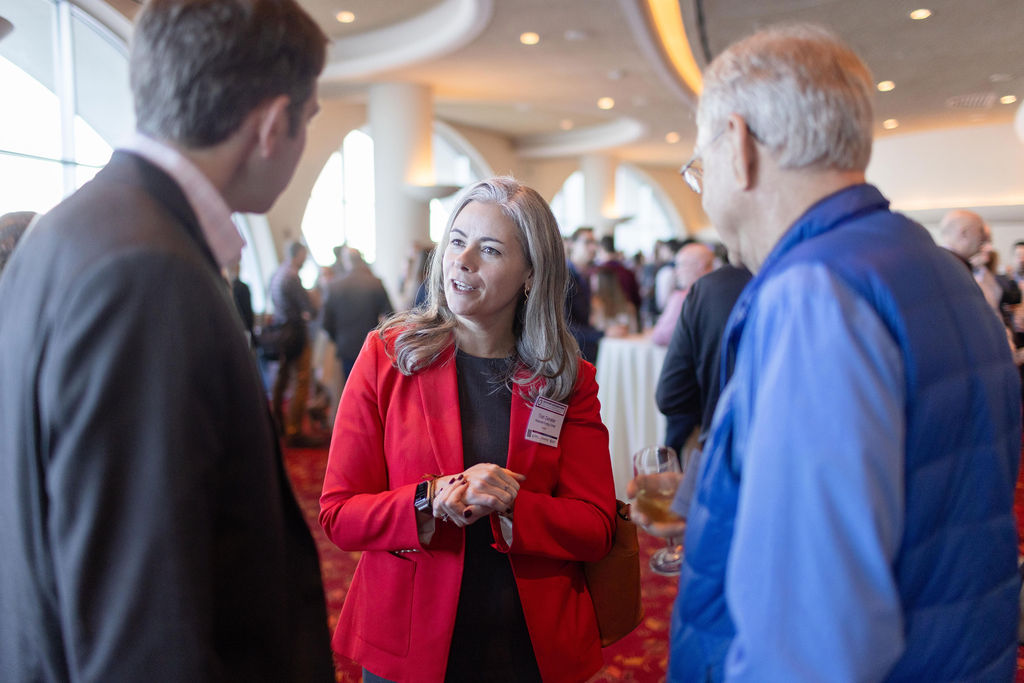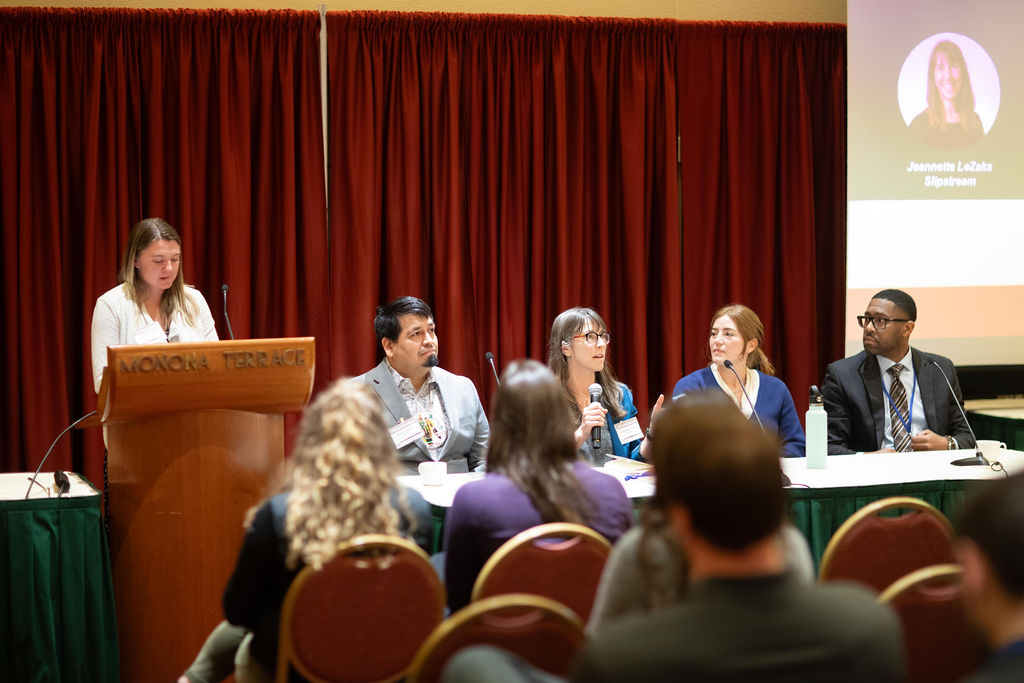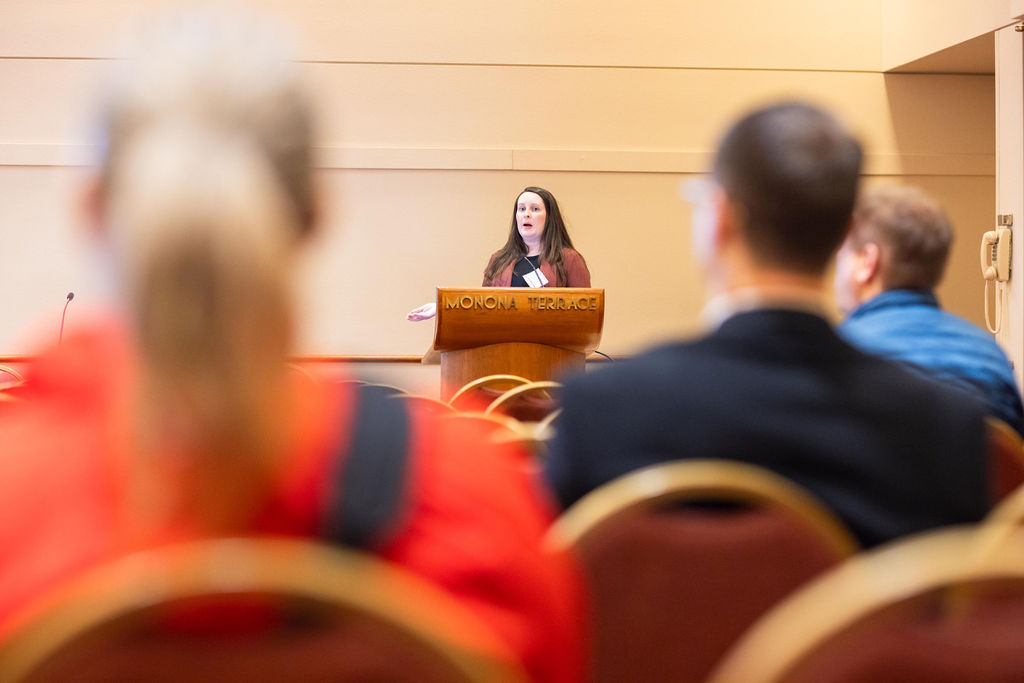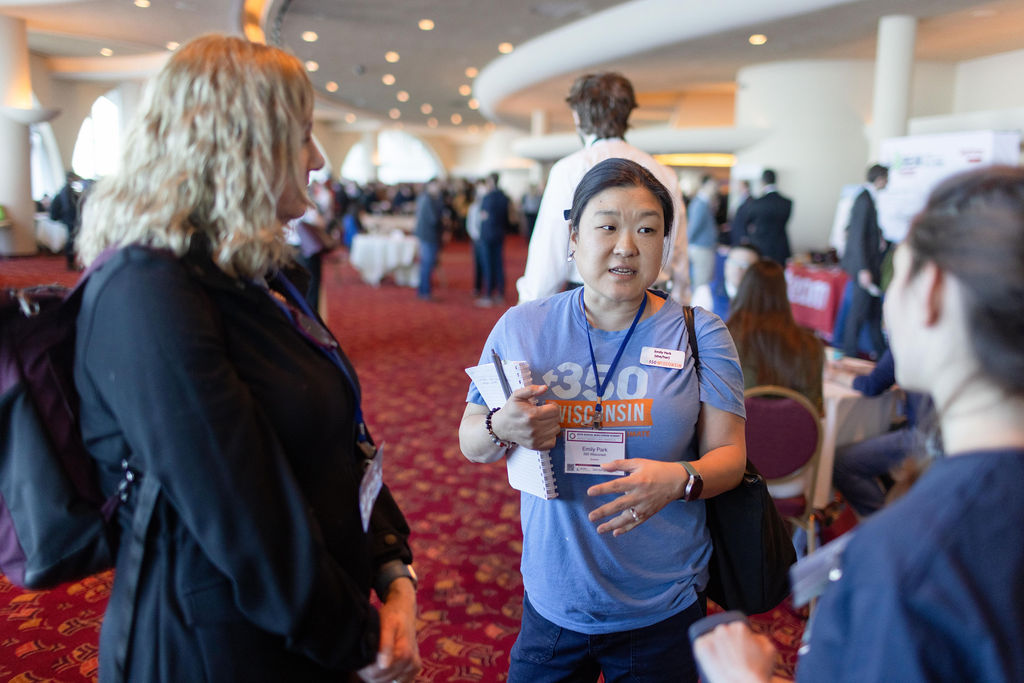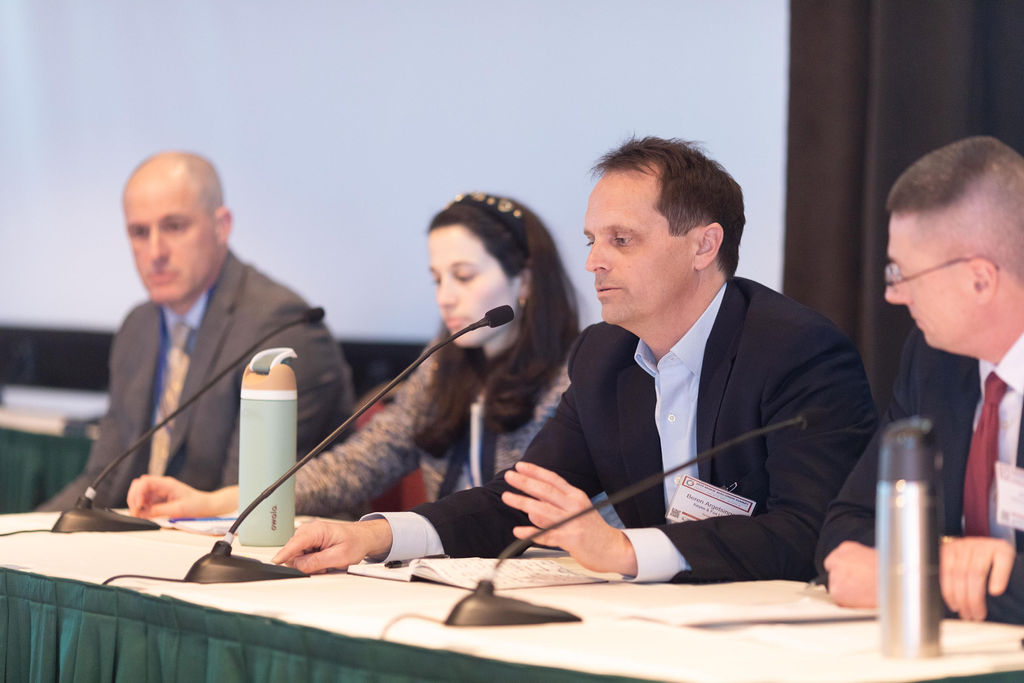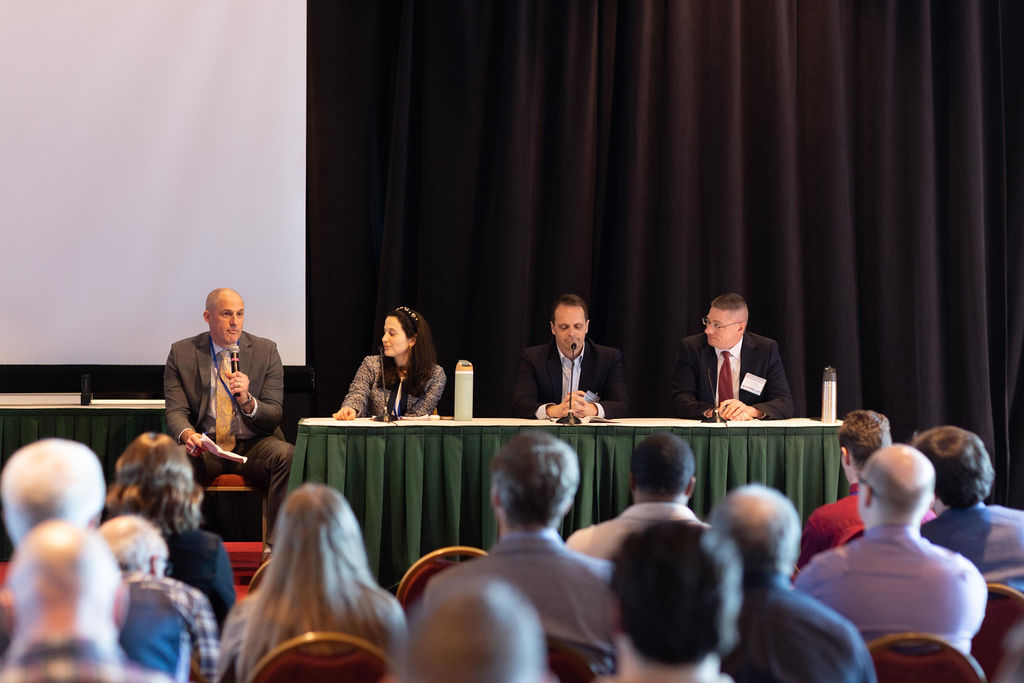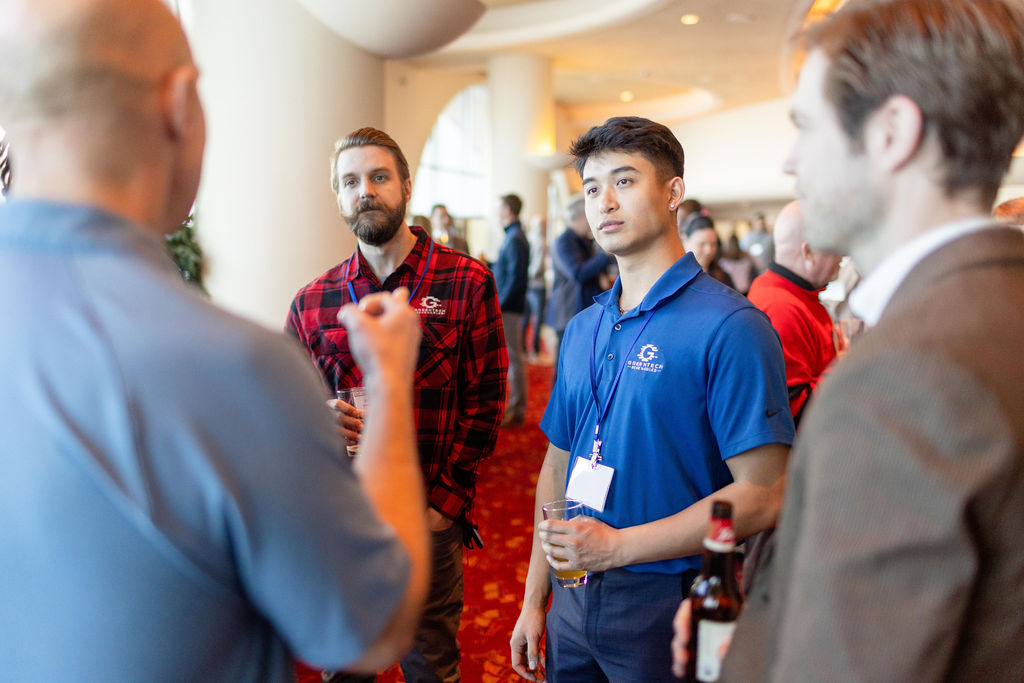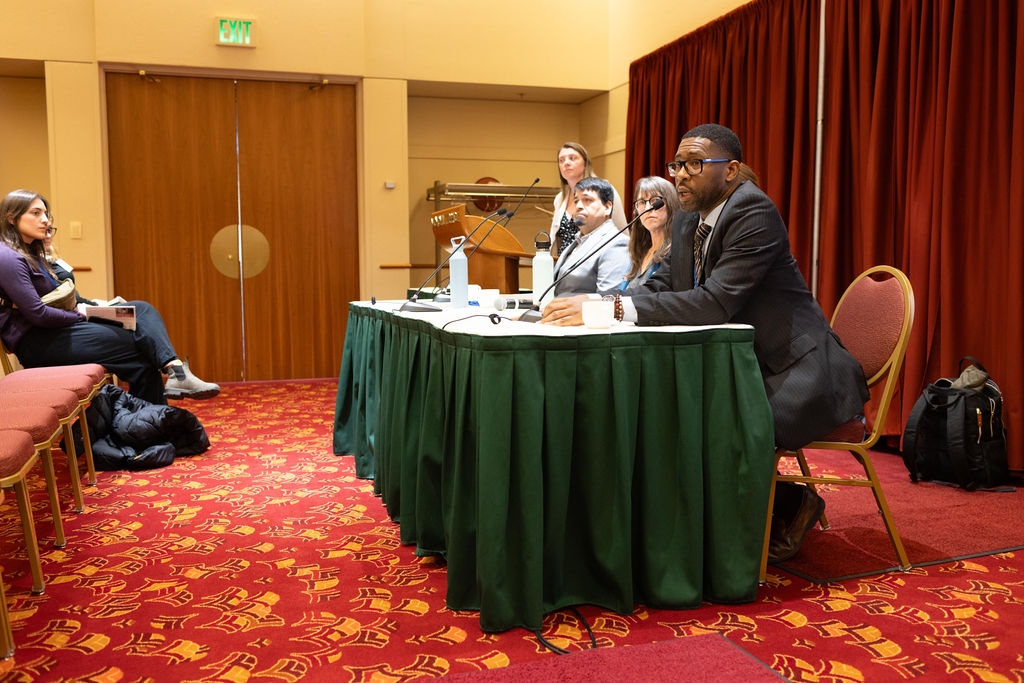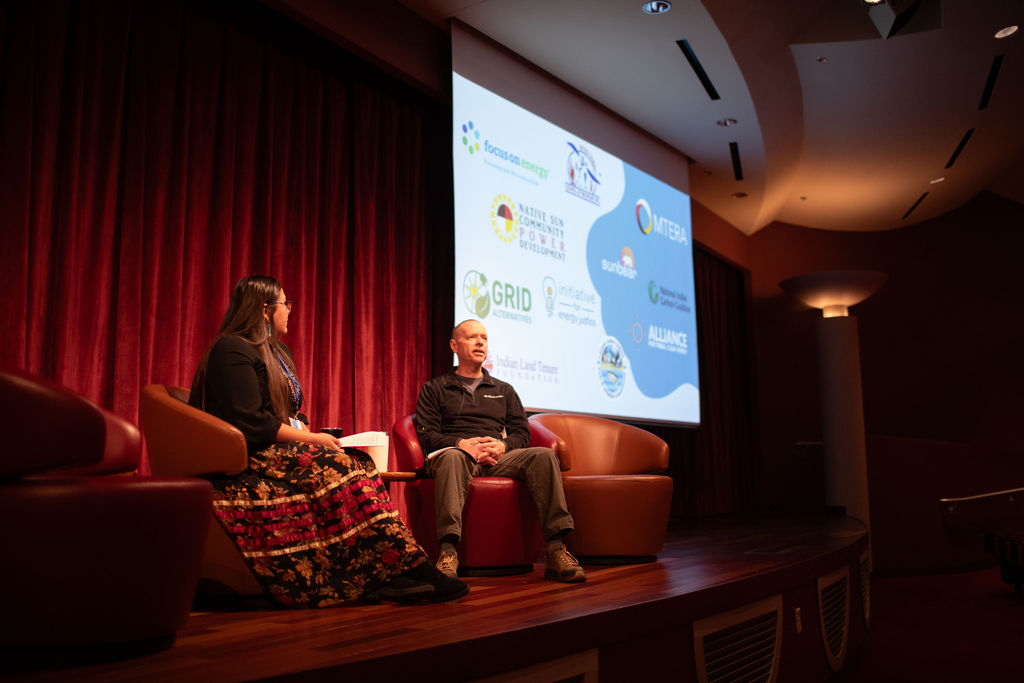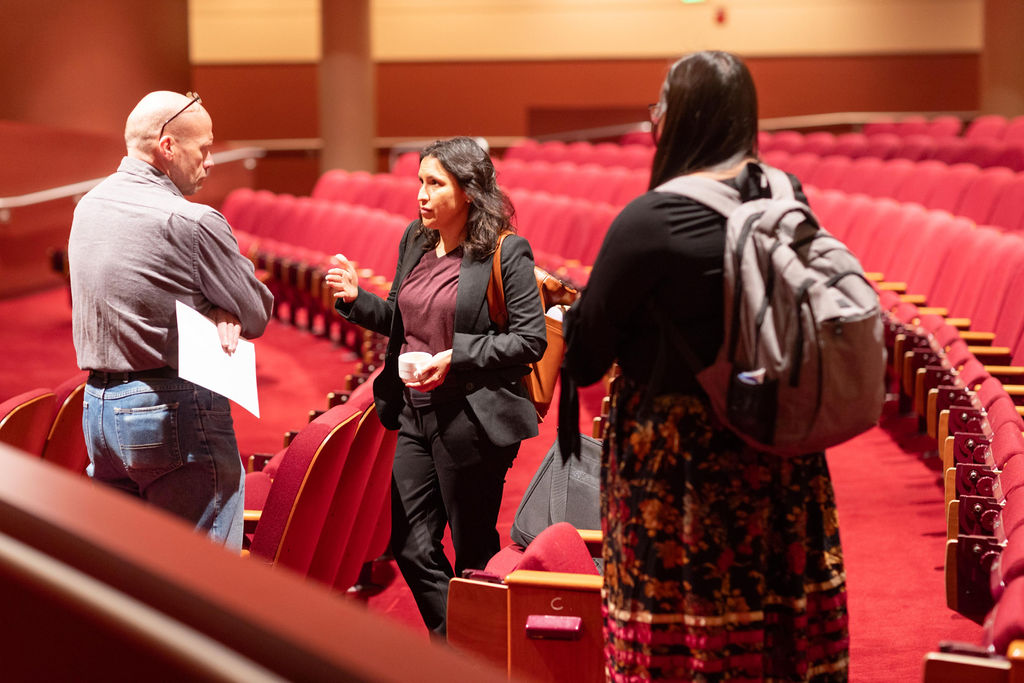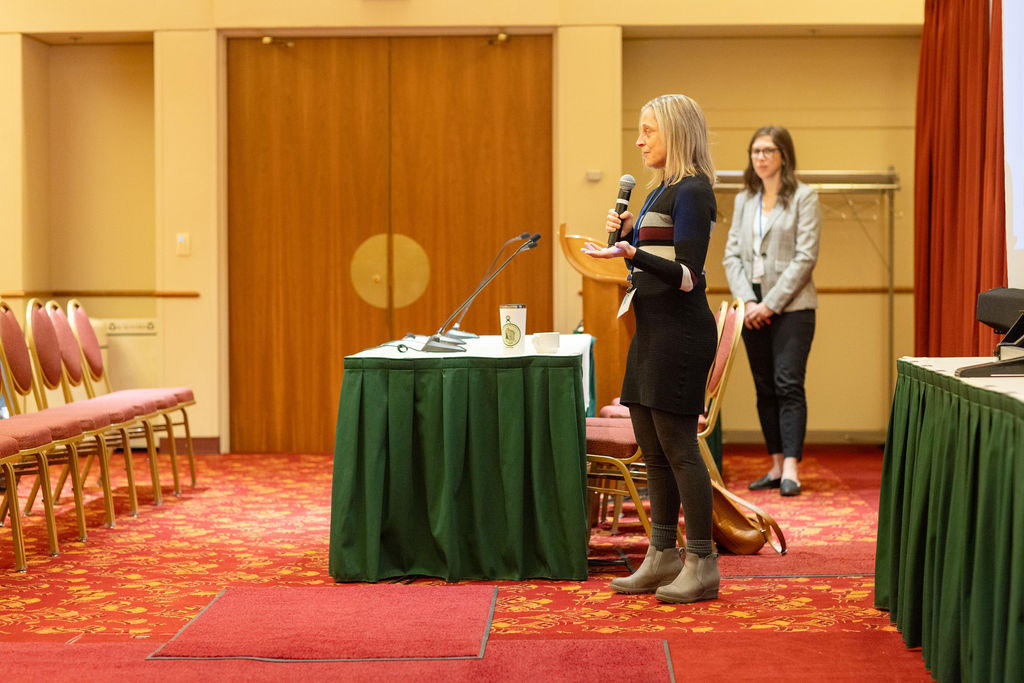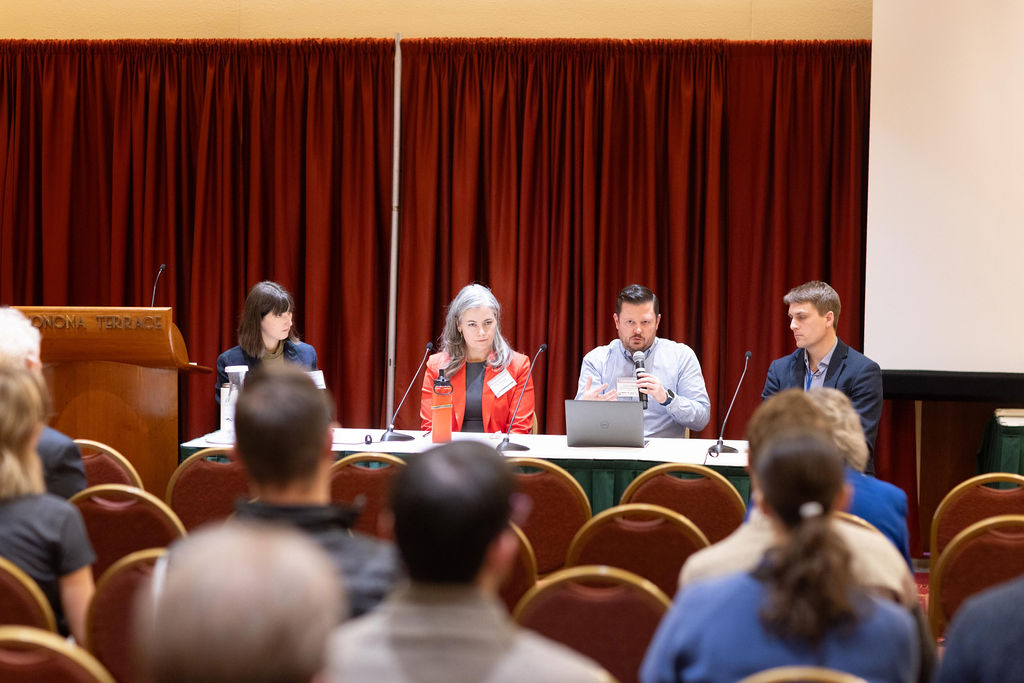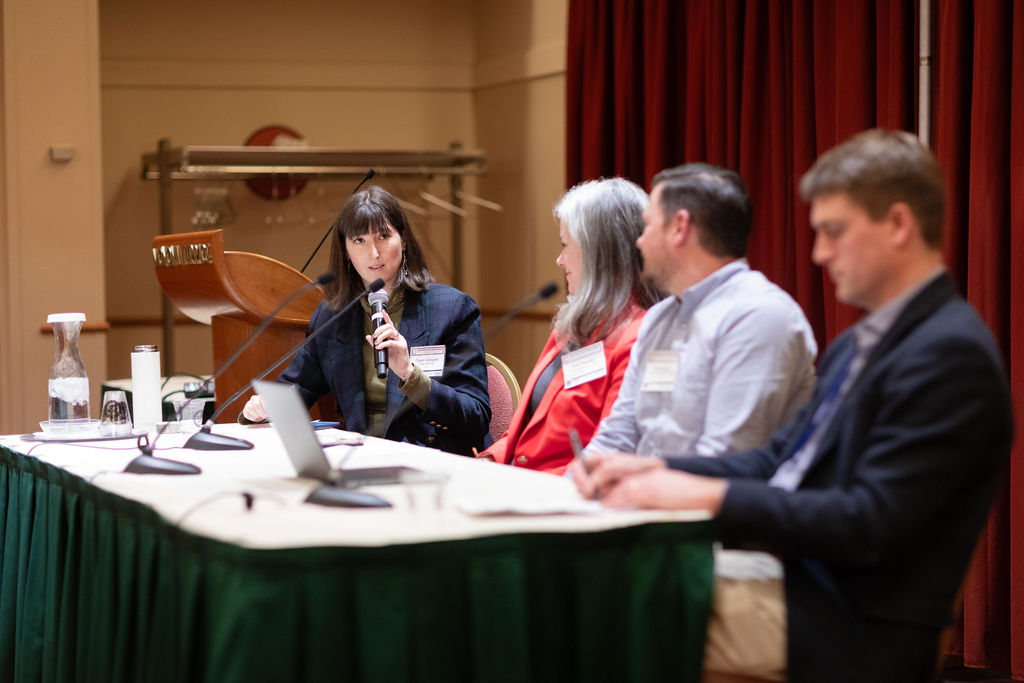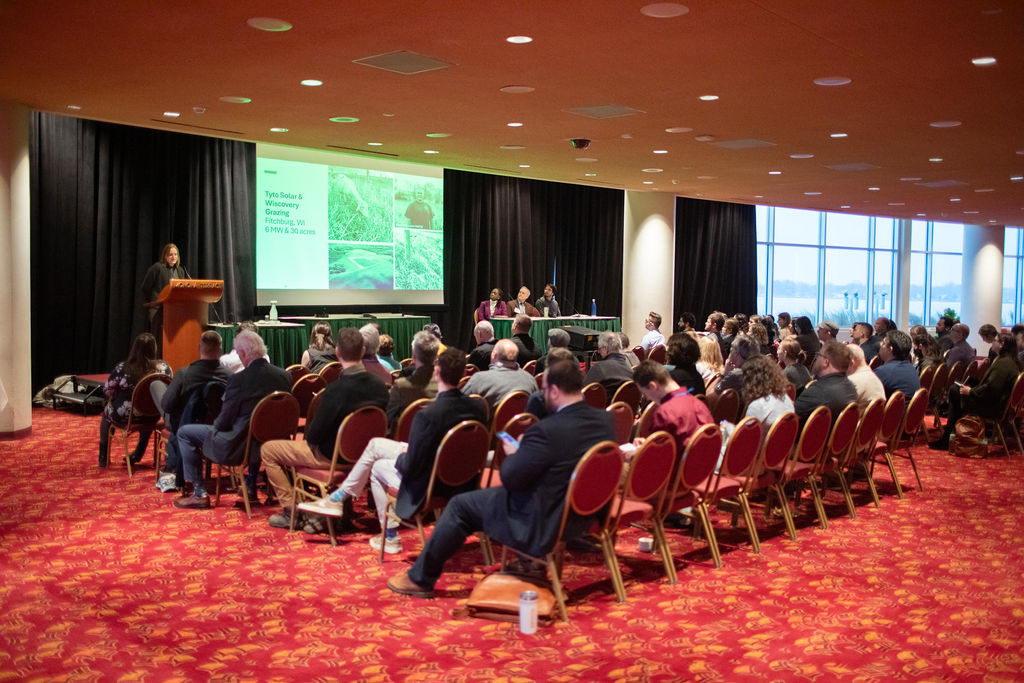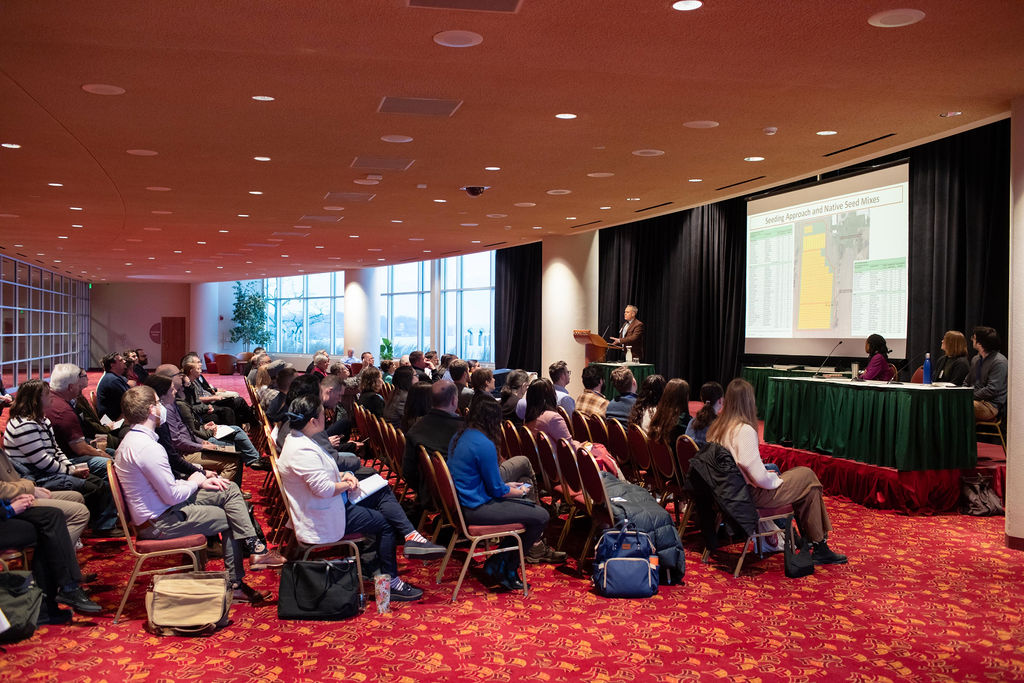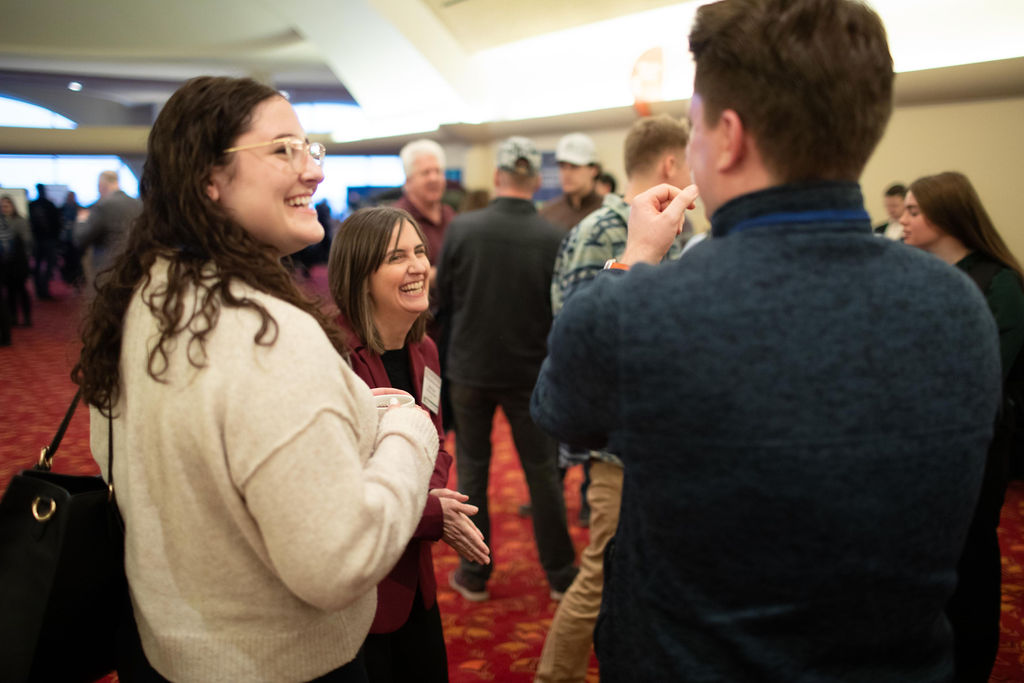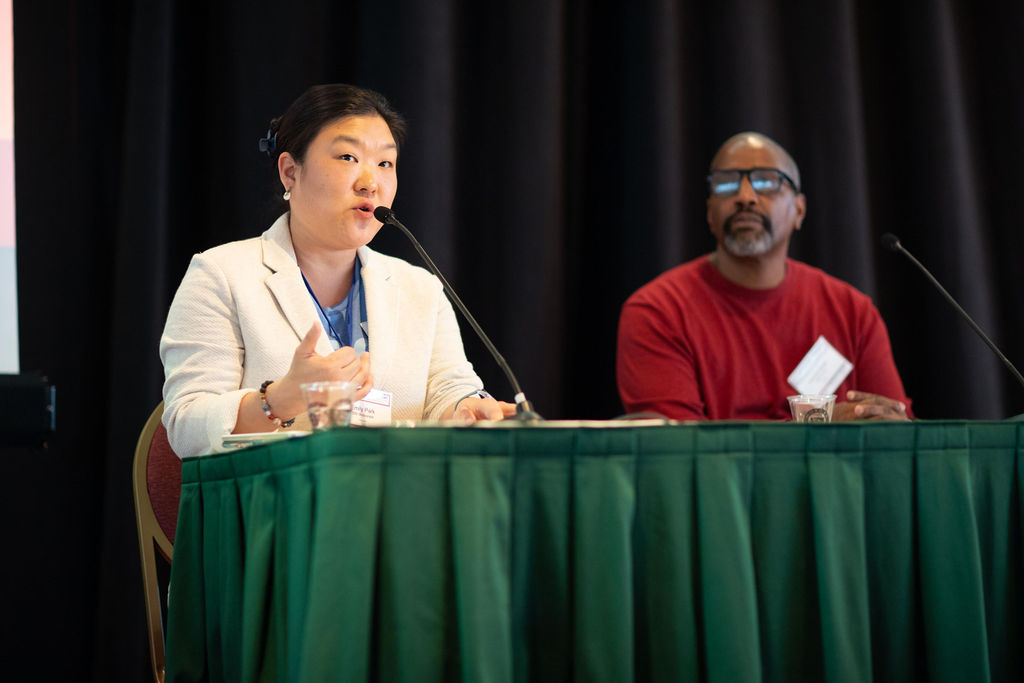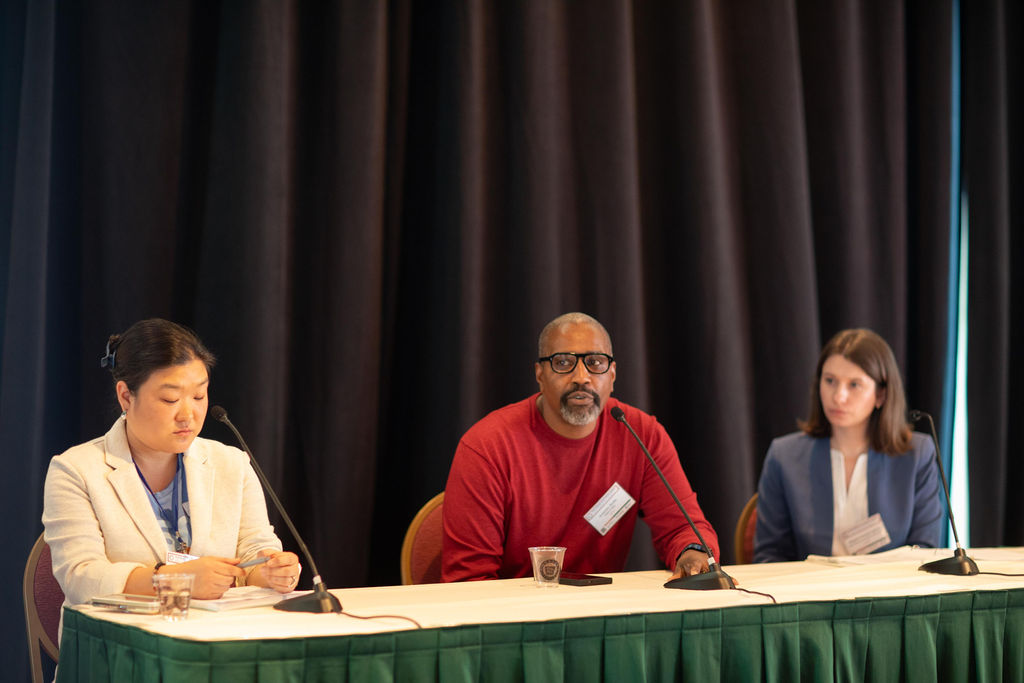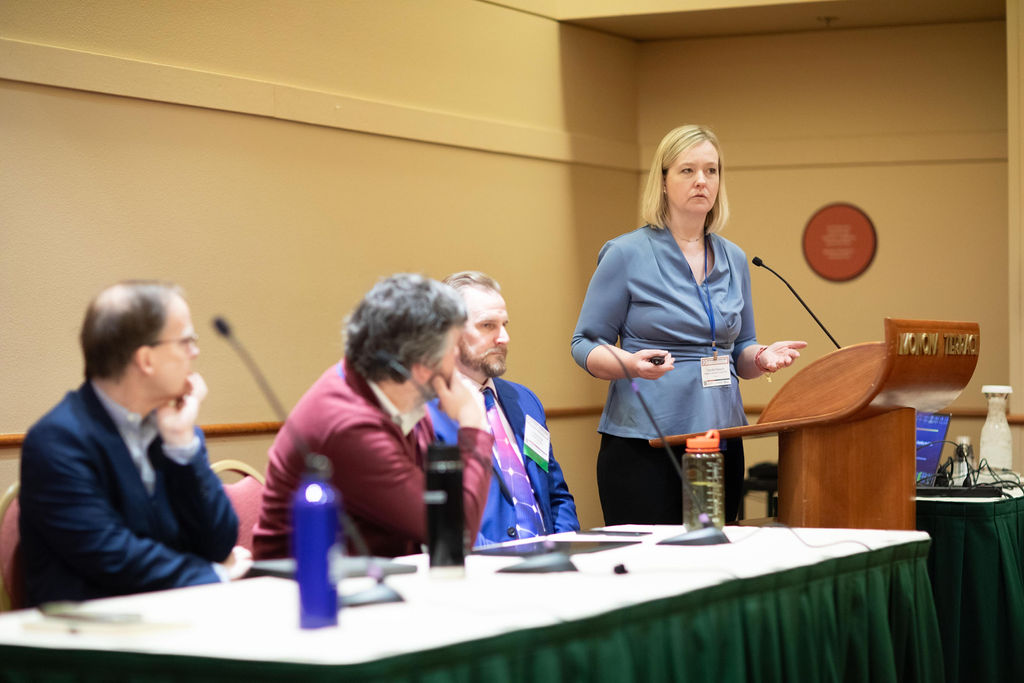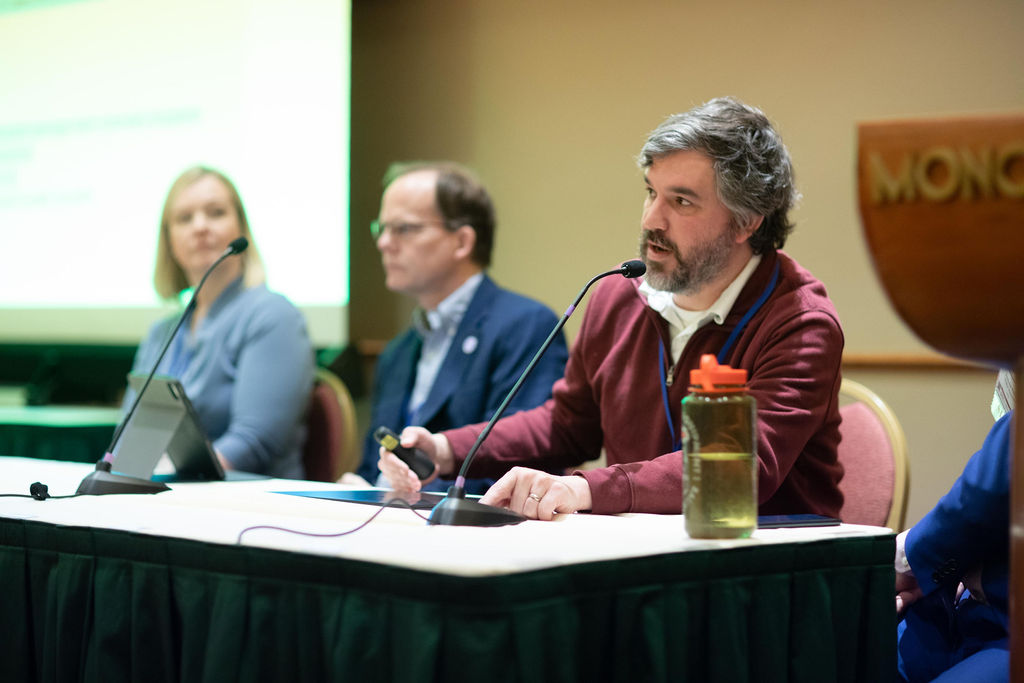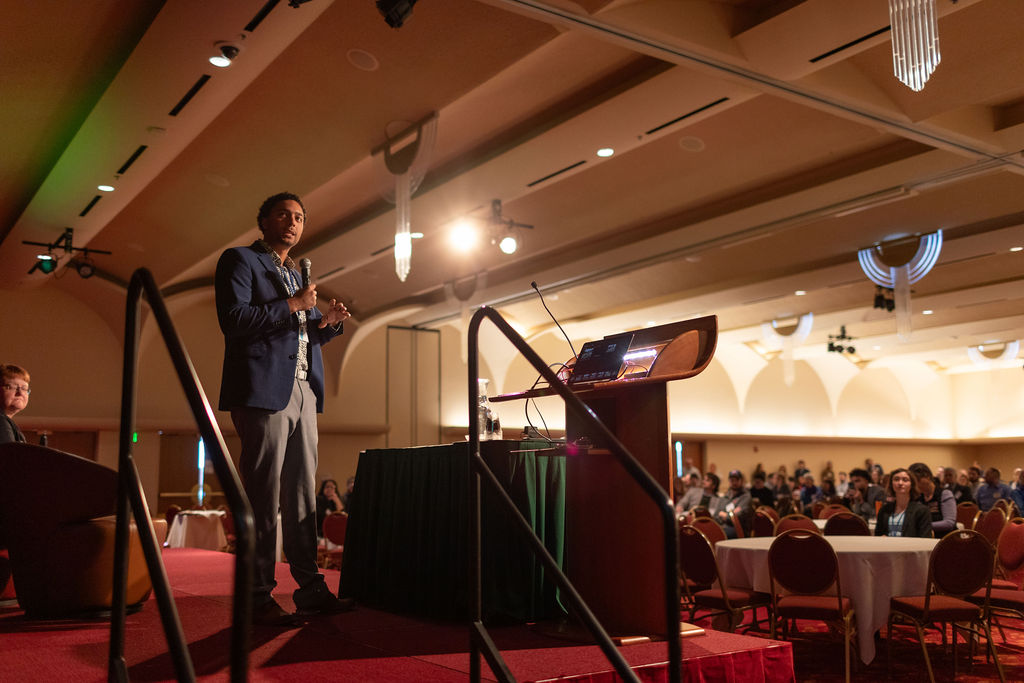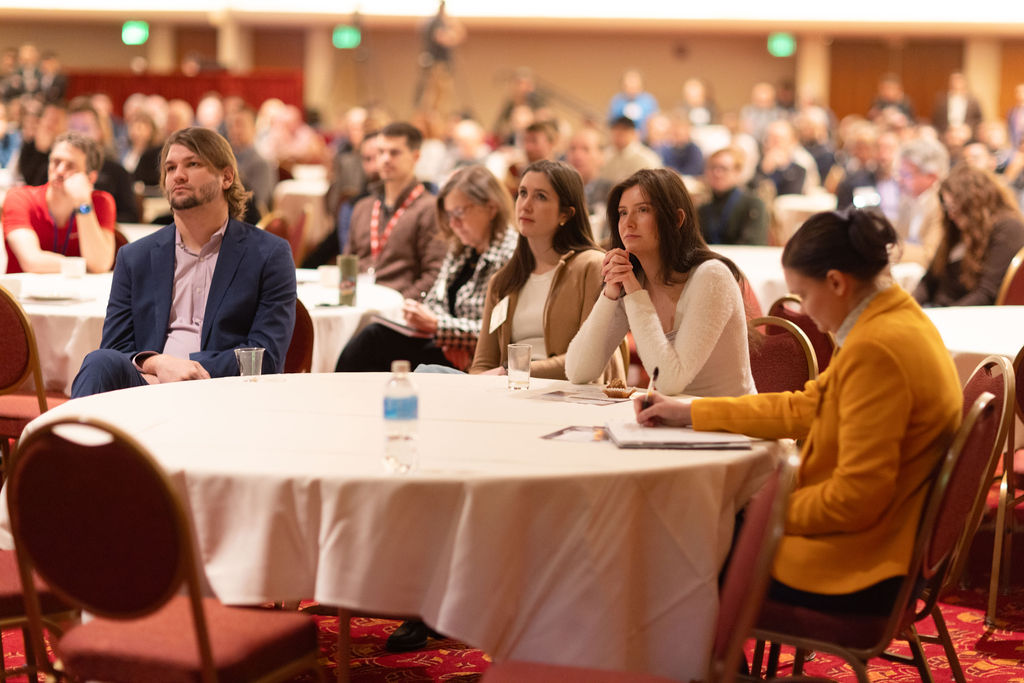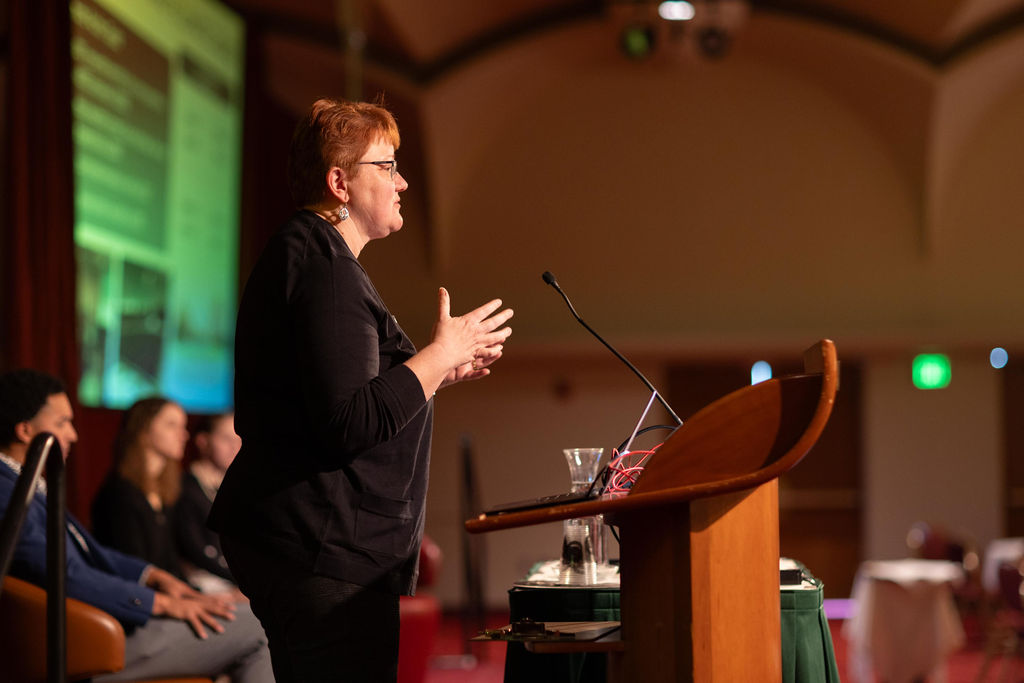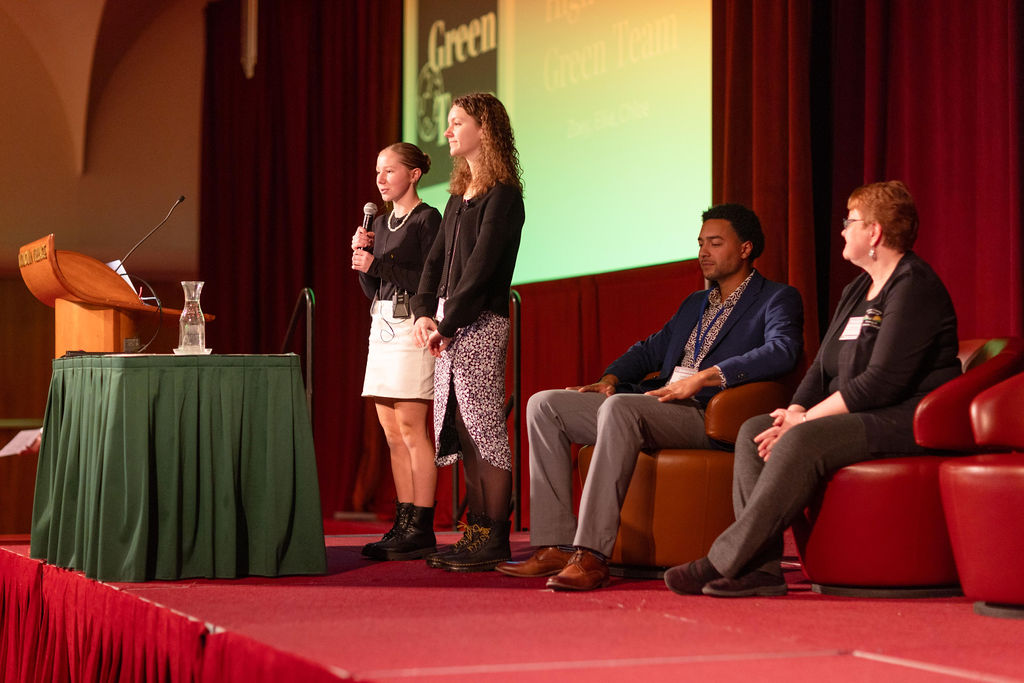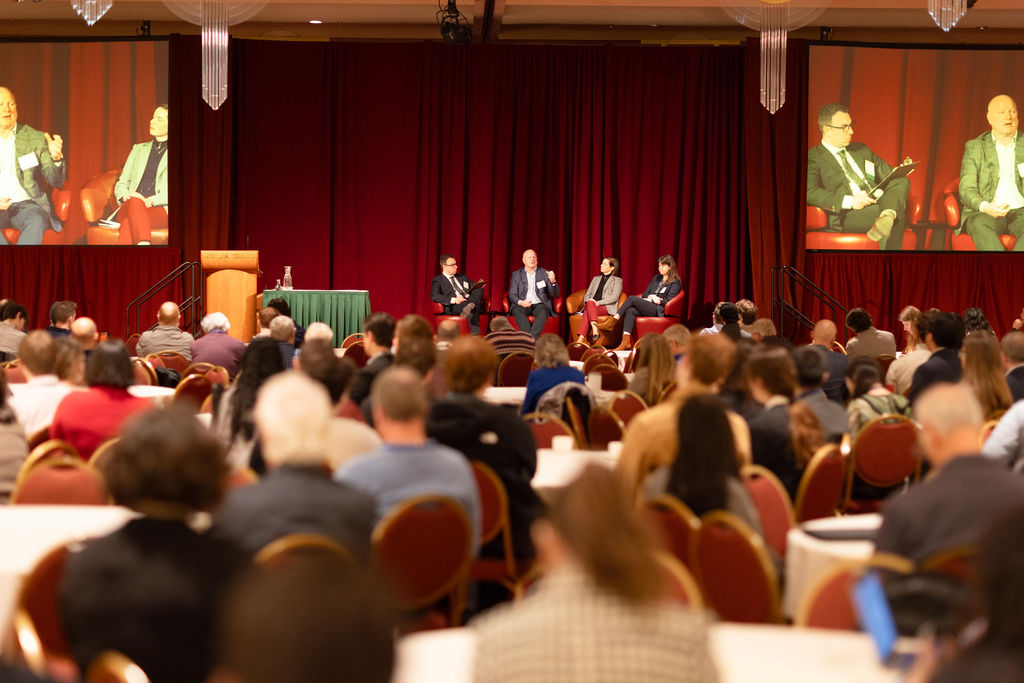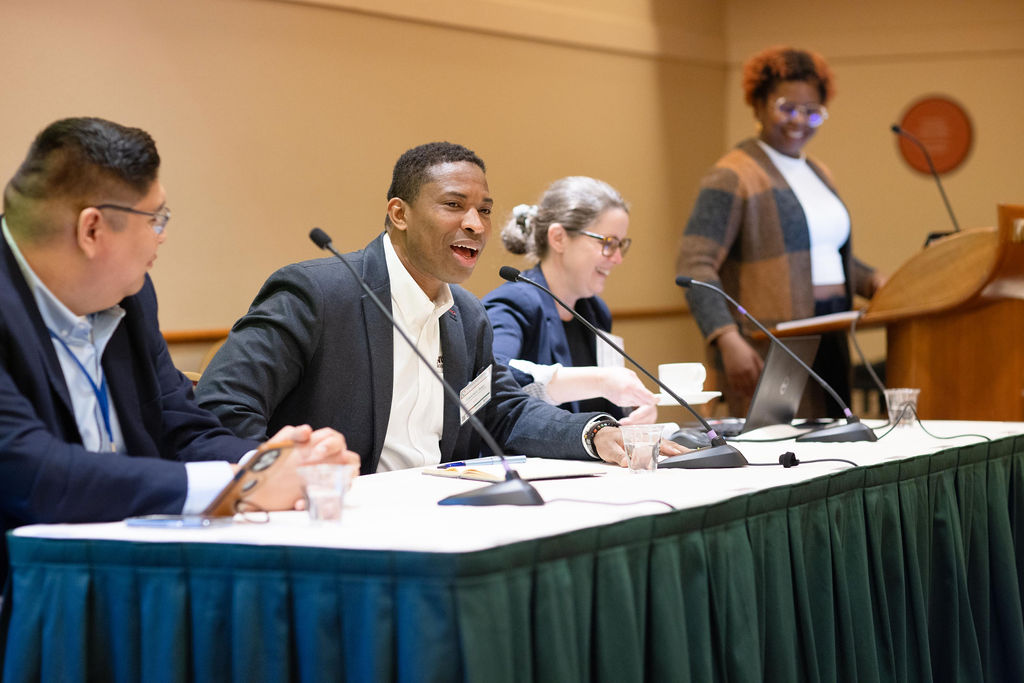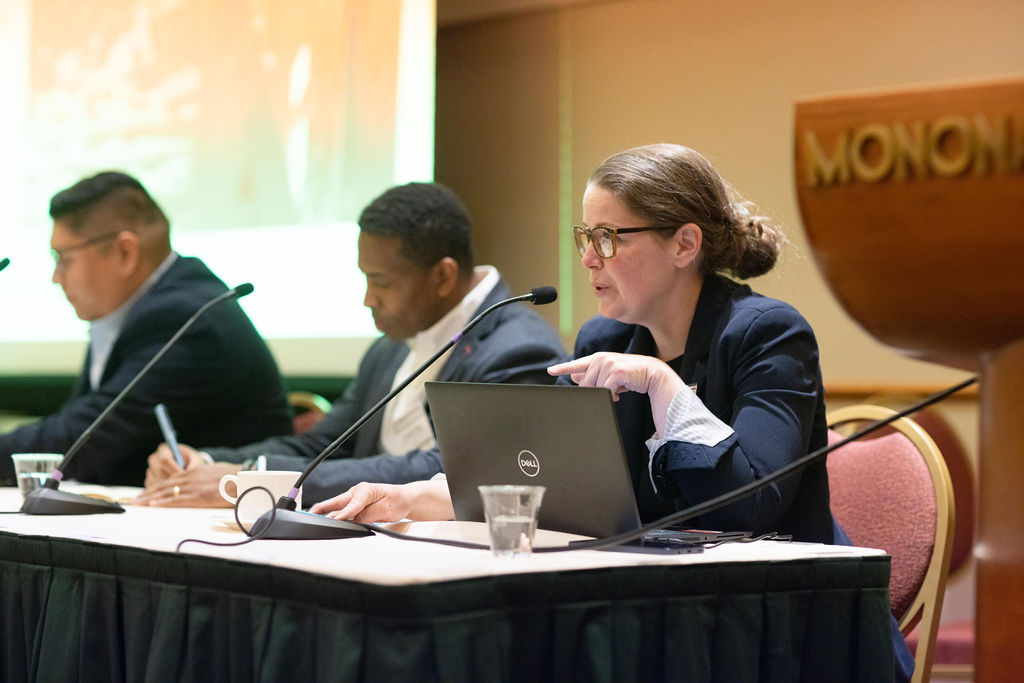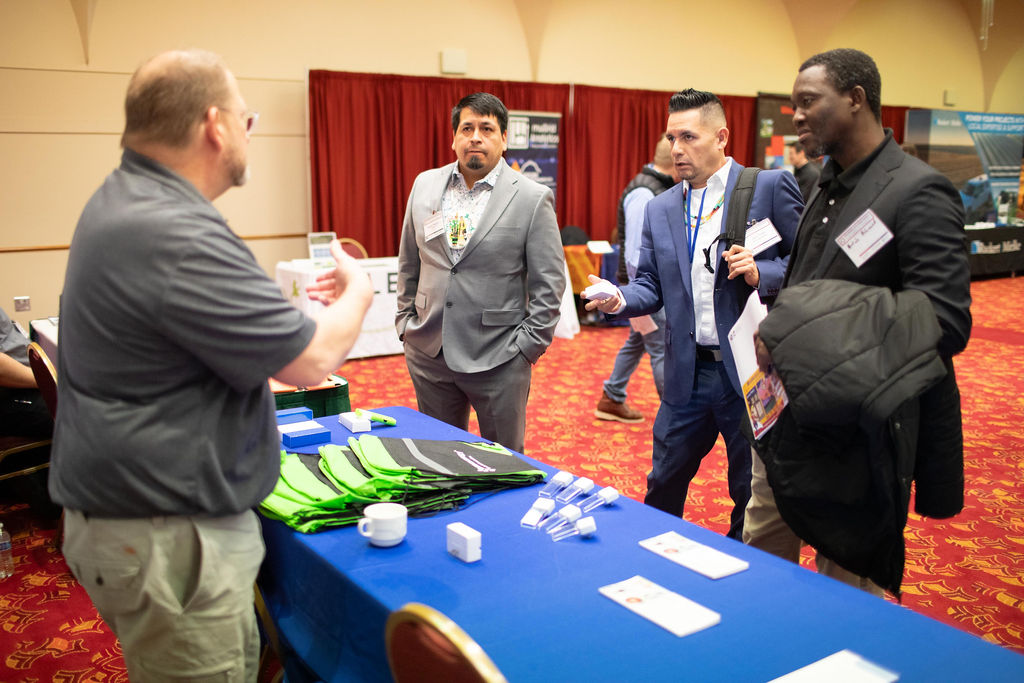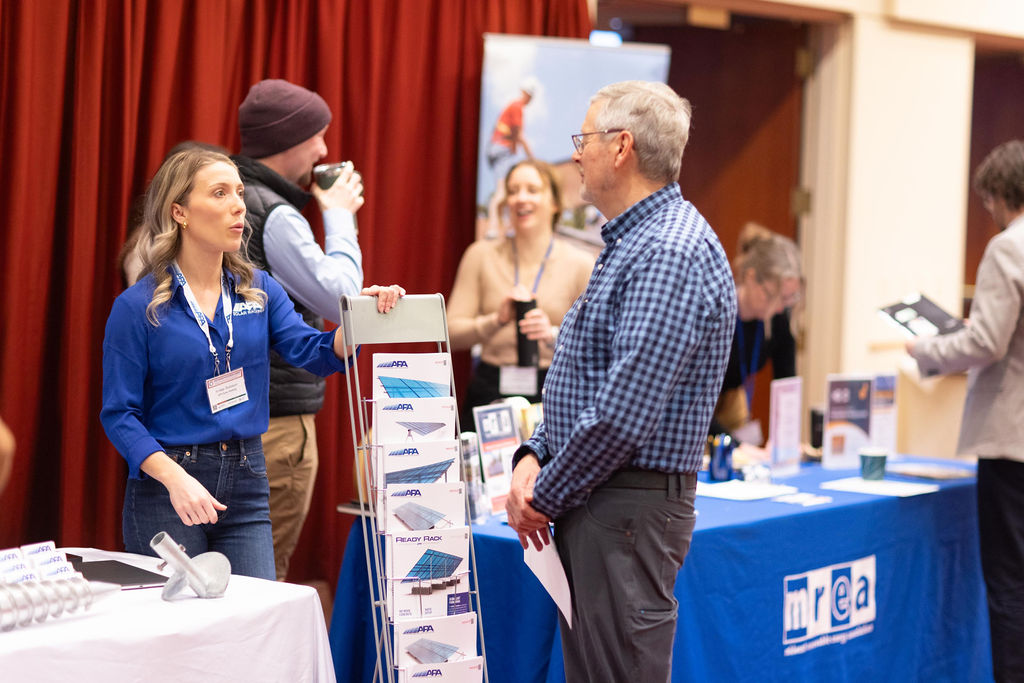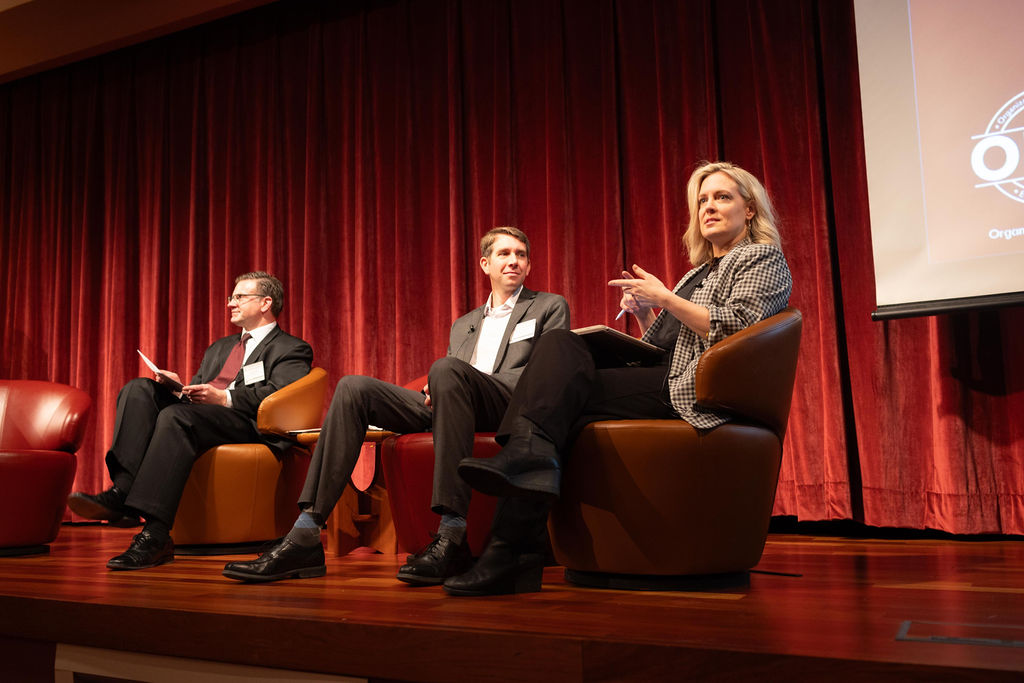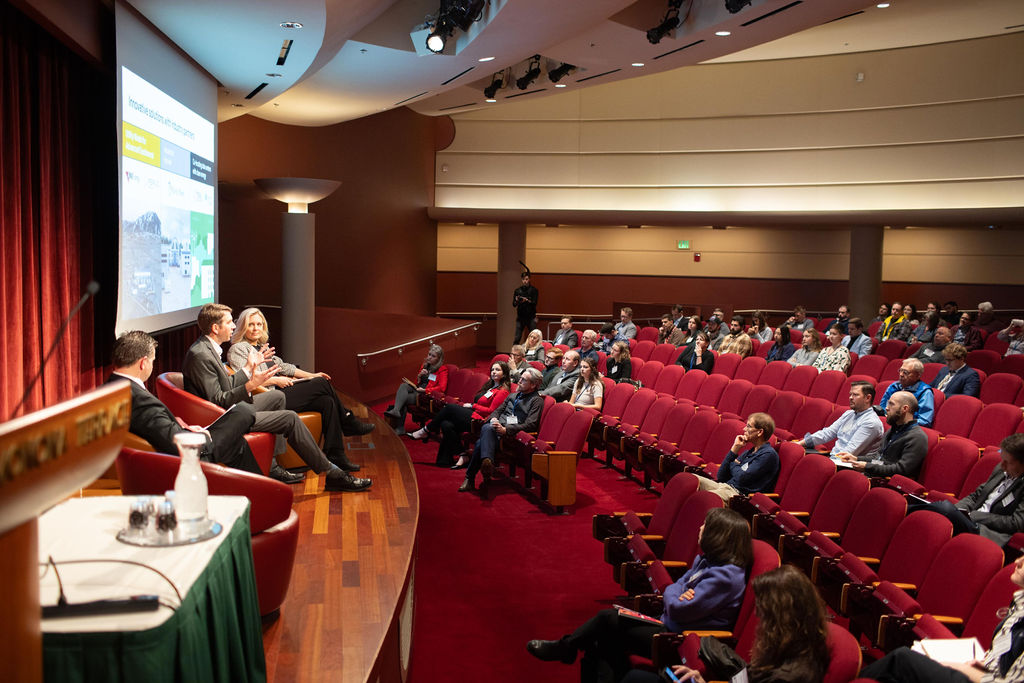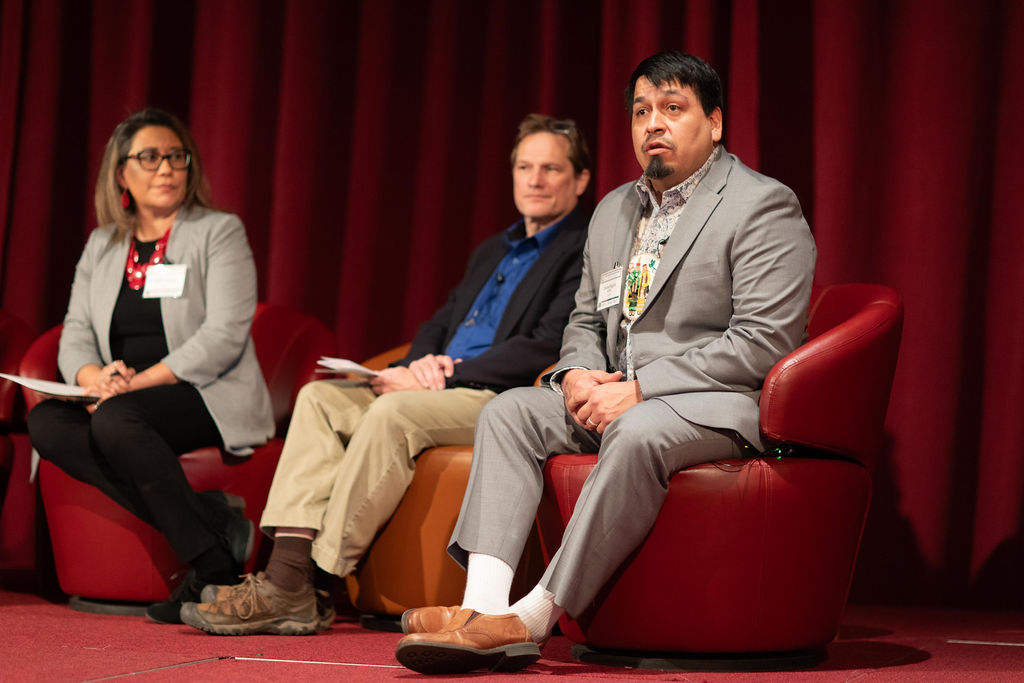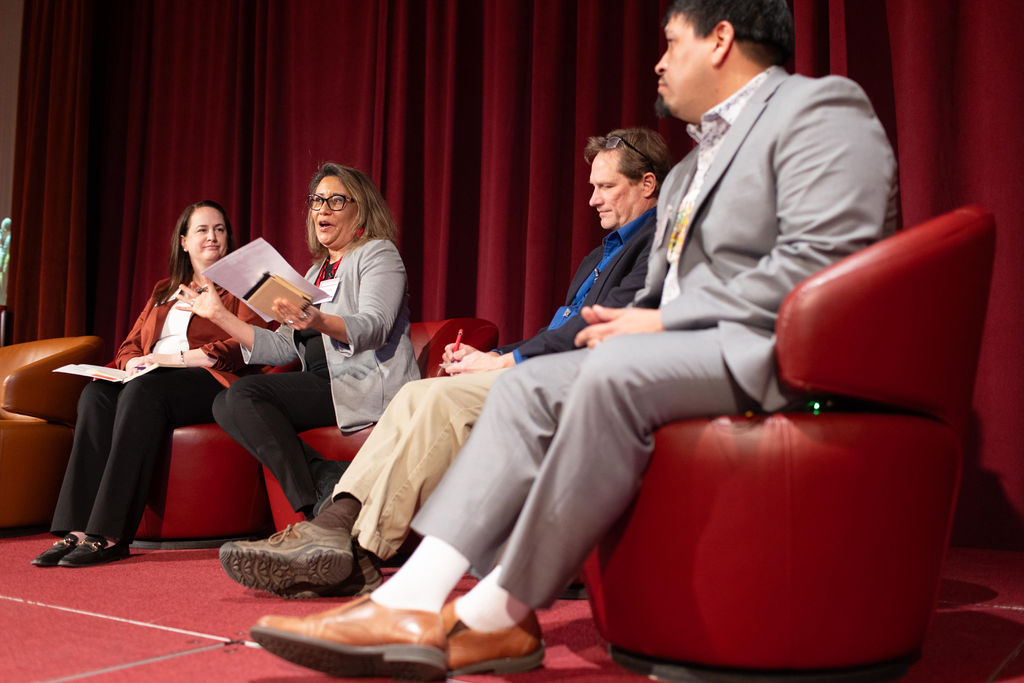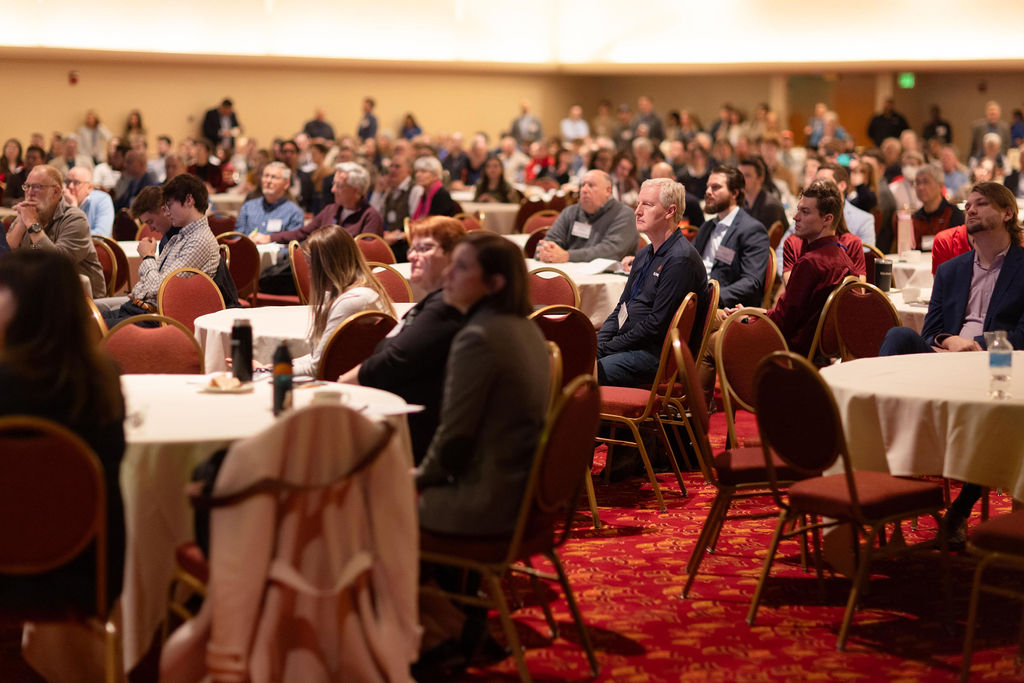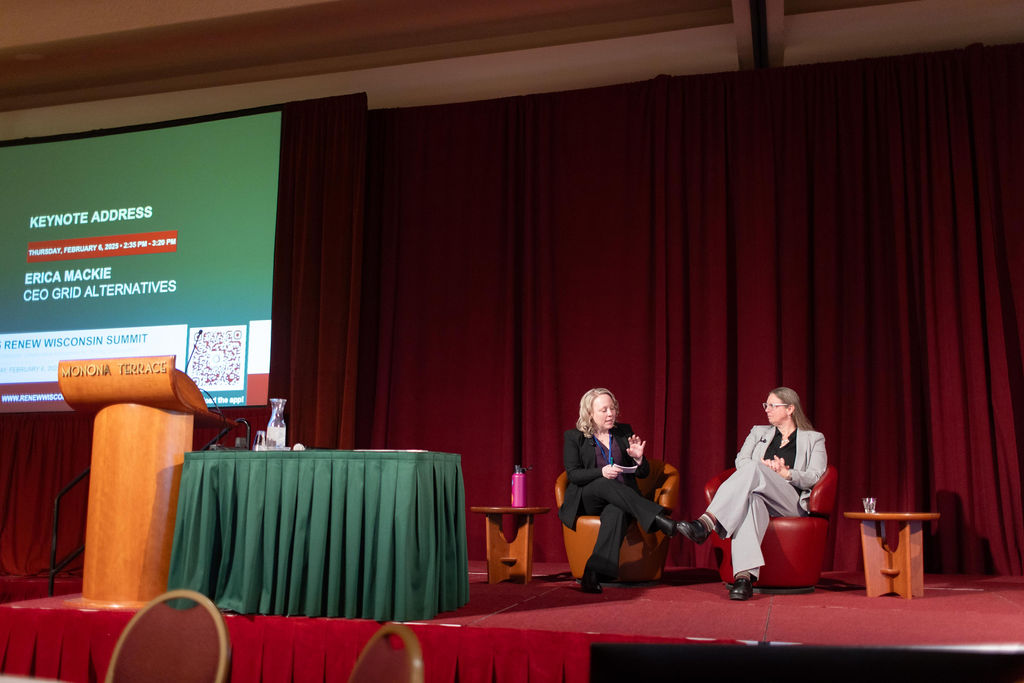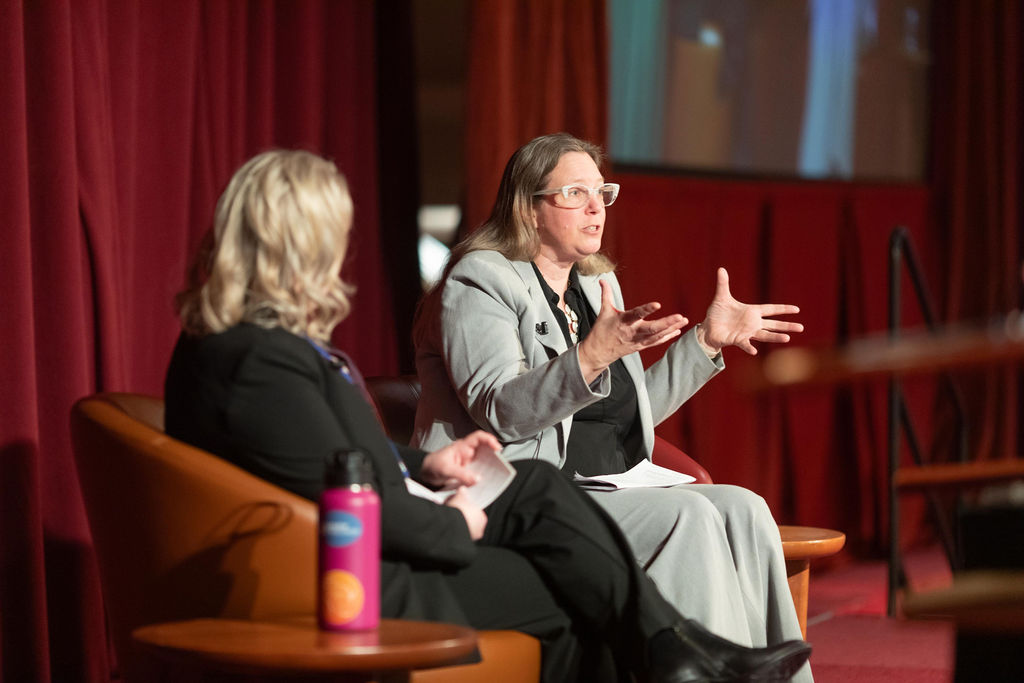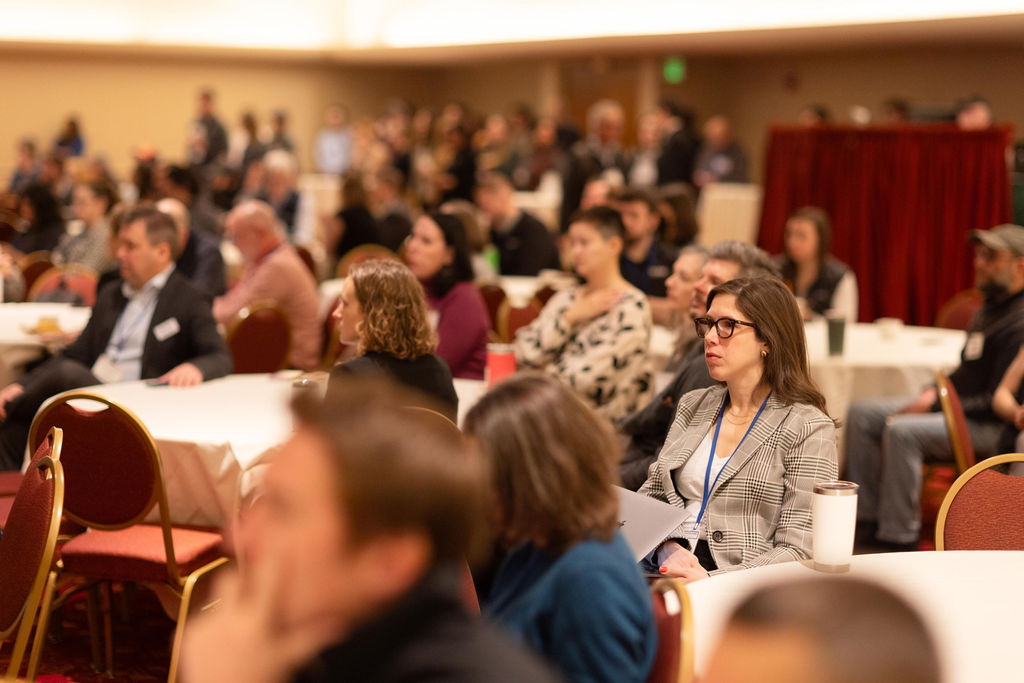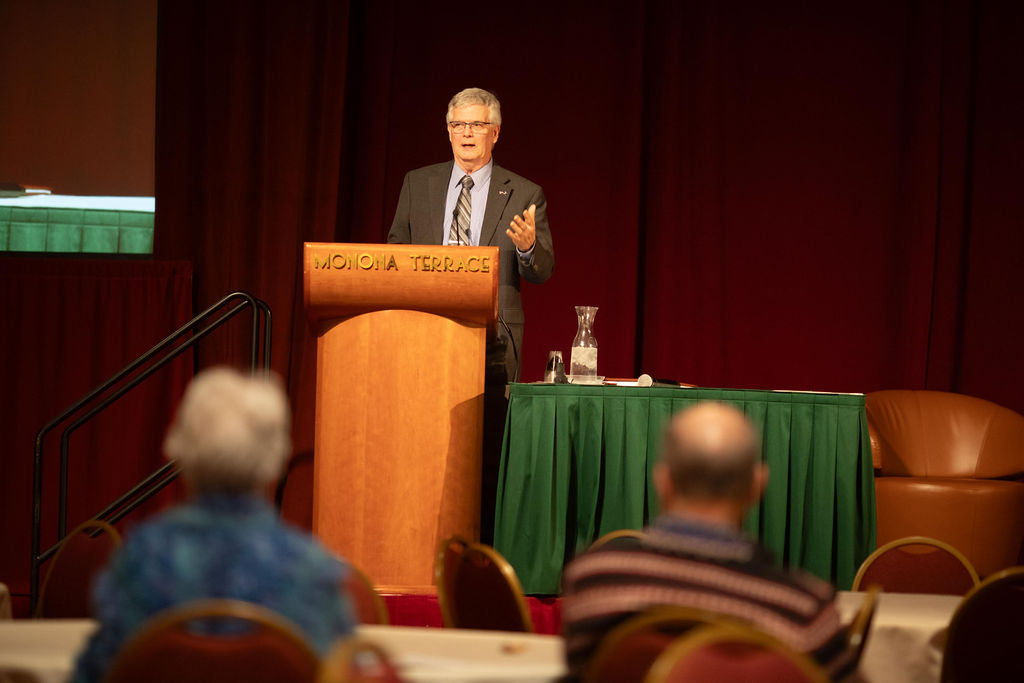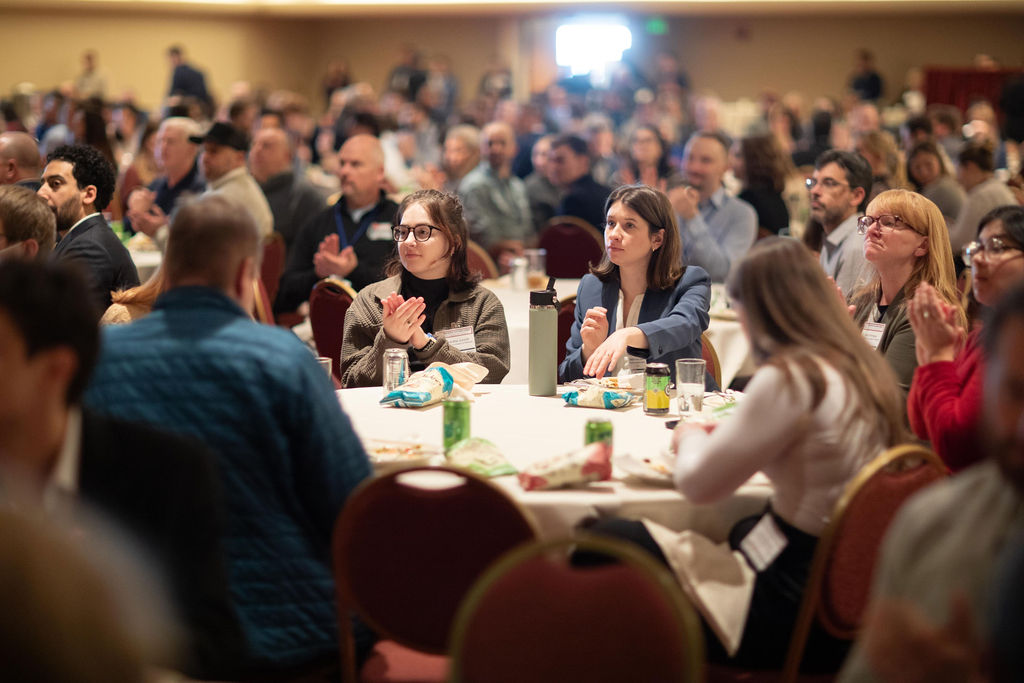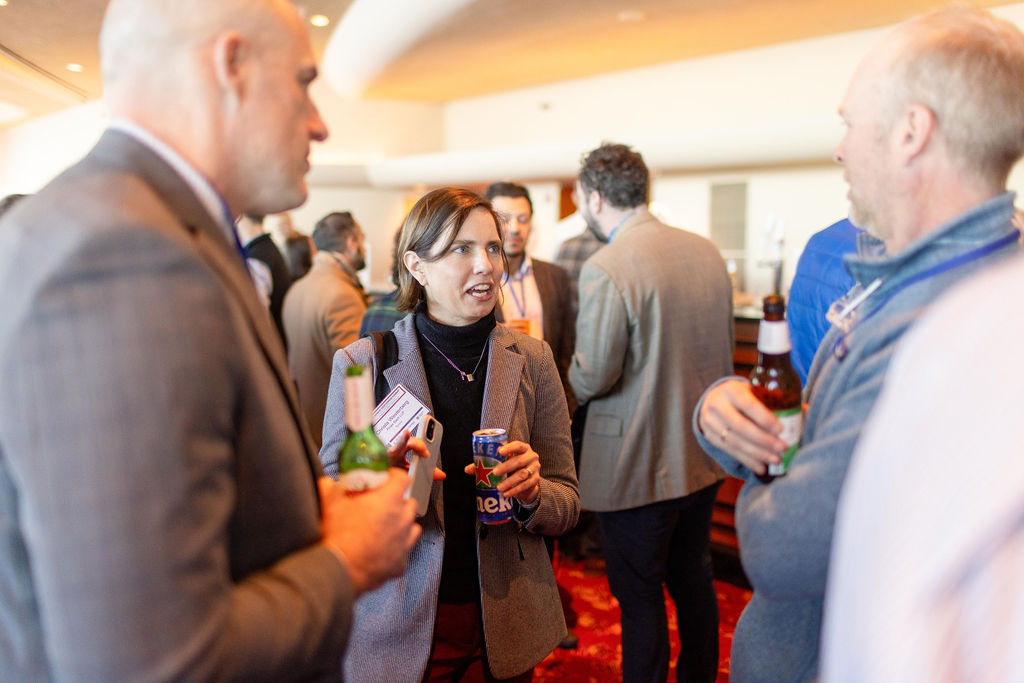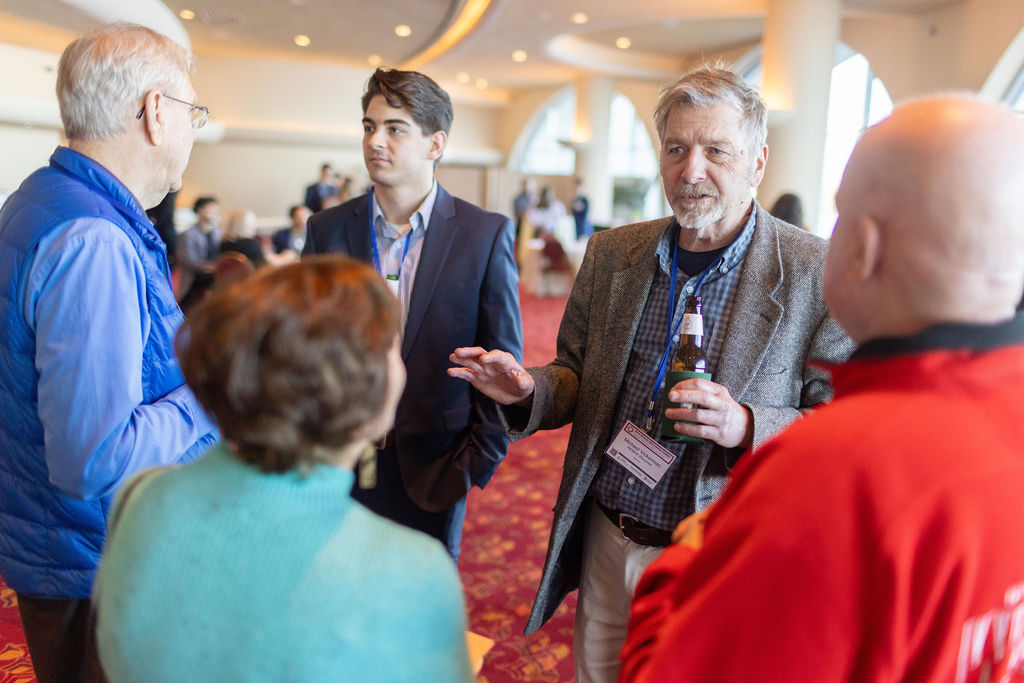
by Alex Beld | Feb 17, 2025 | Community, Events, RENEW Wisconsin
On Thursday, February 6, RENEW held our 14th annual Renewable Energy Summit, presented by Invenergy and Dimension Energy. More than 850 Attendees from across Wisconsin, the Midwest, and even around the globe joined us to discuss state policy, develop professionally, and explore how clean energy is empowering Wisconsin communities.
Not only was this our first Summit that exceeded 800 attendees, but it was also our first time hosting the Energy Pro Demo Day Presented by MREA! Demo Day featured renewable energy education sessions, insights into the latest clean energy technology, NABCEP continuing education credit opportunities, and networking opportunities with top brands and clean energy experts. We are proud to have been able to partner with MREA to add this programming to the Summit. We believe that one of the best ways to ensure a smooth transition to clean energy is to grow and foster the talented workforce that resides in our communities across Wisconsin.
And that’s what the Summit was all about this year, our community. In the year ahead we are looking forward to strengthening and growing the renewable energy community. By maintaining our connections with each other we can use our collective voice to shape our future. This year we had many inspiring speakers who exemplified the spirit of community-focused advocacy for renewable energy.
This year we heard about:
- Innovative clean energy technologies and their real-world applications
- Policy frameworks that support sustainable development and community resilience
- Successful case studies of cross-sector collaborations
- Strategies for ensuring inclusivity and economic equity in the clean energy transition
- Best practices for public engagement and advocacy
We were also joined by the likes of our keynote Erica Mackie, and State Senator Jeff Smith. Erica shared insights on a slew of topics from energy equity and workforce development to collaboration with Tribal Nations and federal policy. Senator Smith closed out the day’s events with a forward-looking message on the renewable energy landscape for Wisconsin and the clean energy industry. Thanks to Erica, Jeff, and everyone else who was either joining us for the first time or the 14th time. It’s your participation that makes this event so impactful.
Beyond the many thoughtful breakouts and inspirational stories we heard, attendees also had many opportunities to catch up with other industry leaders, make new connections, and even find opportunities to help each other find ways to complete their renewable energy goals. As we wrap up another successful Summit, we encourage all of our attendees to keep in touch with us and everyone else they had the chance to connect with this year. Our community has the momentum and the know-how needed to reach our goal of a Wisconsin that runs on clean, reliable energy. Thanks to everyone for joining us this year to share your expertise, enthusiasm, and energy. We can’t wait to do it again in 2026!

by Alex Beld | Feb 7, 2025 | Press Release, RENEW Wisconsin
February 4, 2025, Madison, Wis. — During its 14th annual Renewable Energy Summit, RENEW Wisconsin, with presenting sponsors Invenergy and Dimension Energy, will honor individuals and businesses who have made significant and lasting advances in clean energy development in Wisconsin. The Summit will take place Thursday, February 6, 2025, at Monona Terrace in Madison.
RENEW’s 2025 Summit, titled “Powering Tomorrow: Collaborative Innovations for Thriving Communities,” will convene stakeholders from across the state to discuss the latest advancements in clean energy technologies and collaborative strategies driving the transition to a sustainable future. More than 50 speakers made up of industry leaders and experts, like keynote speaker Erica Mackie co-founder of GRID Alternatives, are joining RENEW at this year’s Summit.
The awards are grouped under five categories:
- Clean Energy Leadership Award: Maria Redmond – Advancing Wisconsin’s clean energy plan
- Clean Energy Community Impact Award: Isaiah Ness – Helping disadvantaged communities transition away from fossil fuels
- Clean Energy Advocate of the Year: Abby Novinska-Lois – Mobilizing health professionals as climate advocates
- Clean Energy Catalyst of the Year: Doral – Developing Wisconsin’s largest solar project
- Member of the Year: Midwest Solar Power – Supporting RENEW Wisconsin and increasing access to clean energy
The ceremony will conclude with the 2023 Clean Energy Honor Roll, in which RENEW will recognize 13 clean energy projects in Wisconsin that recently commenced operation. Whether on the basis of their productivity, innovativeness, attention to detail, scale, resourcefulness, or efficacy in reducing carbon emissions, these projects showcase the skills and know-how Wisconsin stakeholders bring to the clean energy marketplace.
Clean Energy Honor Roll:
- Menominee Nation Elder Homes, Menominee Nation
Solar and battery backup installations
- Edgerton Retirement Apartments, Edgerton
Solar-powered retirement apartments
- Centro, Madison
Solar-powered nonprofit facility
- Kwik Charge, Ashland, Menomonie, Chippewa Falls, West Salem
DC fast-charging stations at four western Wisconsin locations
- Grant County Solar, Potosi
200-megawatt utility-scale solar installation with battery storage
- Charter Steel, Saukville
Largest behind-the-meter solar project in Wisconsin
- Paris Solar Farm, Kenosha County
200-megawatt utility-scale solar installation
- The Sonnentag Events Center and Fieldhouse, Eau Claire
Sustainable multi-use community complex
- Dane County Humane Society Flight Pen, Madison
50-kilowatt flight pen for birds of prey
- Holiday Ford Building and Collision Center, Fond du Lac
469-kilowatt solar array and EV charging station
- Green Bay Area Public School District, Green Bay
Solar generation on schools
- Granite Ridge Elementary School, Cottage Grove
Solar generation on schools
- Madison Metropolitan School District, Madison
Solar generation on schools
- Nicolet High School, Glendale
Solar generation on schools
- Badger Hollow Solar Park, Iowa County
300-megawatt utility-scale solar installation
The award ceremonies will be held in two parts, with the first highlighting the individual awards and the second focusing on the Clean Energy Honor Roll, in which RENEW will recognize both people and projects for their role in the clean energy transition. Whether on the basis of their productivity, innovativeness, attention to detail, scale, resourcefulness, or efficacy in reducing carbon emissions, these accomplishments highlight the skills and know-how that Wisconsin stakeholders bring to the clean energy marketplace in the Badger State.
Click here for more information on the 2025 Summit program agenda, speakers, and registration. For press passes, please email Alex Beld (abeld@renewwisconsin.org).
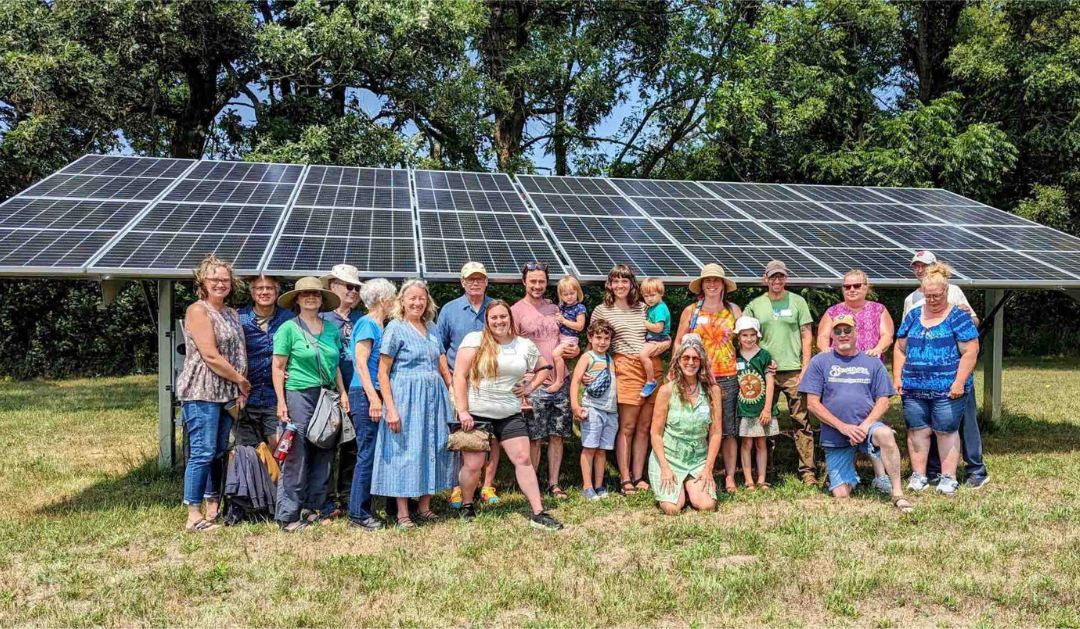
by Tiana Snyder | Nov 21, 2024 | Press Release, RENEW Wisconsin, Solar, Solar for Good
The Solar for Good grant program has awarded over $220,000 in grants and solar panel donations to Wisconsin nonprofit organizations for the Fall 2024 grant round. The 14 nonprofits will install 16 projects for a total of 1,000 kilowatts of solar electricity, leading to more than $2.3 million in renewable energy investments in Wisconsin.
The following organizations have been awarded Fall 2024 Solar for Good grants to install new solar energy
systems:
CAP Services, Inc. – community service, Stevens Point
COULEECAP, Inc. Hillcrest Manor – affordable housing, Ontario
COULEECAP, Inc. REACH – community service, La Crosse
EAGLE School of Madison – education, Fitchburg
Family and Children’s Center – community service, La Crosse
Family Services of Southern Wisconsin and Northern Illinois, Inc. – community service, Beloit
Holy Spirit Parish – house of worship, Stevens Point
Hunger Task Force – community service, West Milwaukee
Ozaukee Food Alliance – community service, Saukville
Recreation and Fitness Resources Center – recreation, Bayfield
Union Congregational United Church of Christ – house of worship, Green Bay
VIA CDC – affordable housing, Milwaukee
West Central Wisconsin Community Action Agency – affordable housing, Hudson
*One organization has asked to remain anonymous.
The grant recipients from the Fall 2024 grant round are a diverse range of organizations, representing affordable housing organizations, schools, and houses of worship. Each facility’s solar project will have a significant impact on their budgets, and will allow them to focus more funds on their missions. Holy Spirit Parish will install 90 panels atop their place of worship in Stevens Point, Family Services of Southern Wisconsin will incorporate 69.6kW of solar to their rooftop, and VIA CDC will install solar systems of 5.33 kilowatts on three housing projects in Milwaukee.
“We are thrilled and deeply grateful for this opportunity through RENEW Wisconsin’s Solar for Good initiative. This support allows us to further our mission with VIA’s Turnkey Program and new construction housing, making a lasting, positive impact on our community through sustainable energy,” said JoAnna Bautch, Executive Director at VIA CDC.
Similarly, the Solar for Good grant will allow Family Services of Southern Wisconsin and Northern Illinois to continue serving families in need by reducing operational costs and allocating more funding to programming.
“This funding has allowed us to equip our Next Steps Family Resilience Center with solar power that will be vital to the long-term sustainability of this programming for unhoused parents with young children while also contributing to a healthier community overall,” said Kelsey M. Hood-Christenson, President and CEO, of Family & Children’s Services of Southern Wisconsin and Northern Illinois.
Since 2017, Solar for Good has awarded grants to over 200 nonprofits across Wisconsin, leading to more than $29.4 million of renewable energy investments in the state. Collectively, Solar for Good grant recipients will go on to install more than 10 megawatts of solar energy.
“We are most grateful to the Couillard Solar Foundation for awarding us half the solar panels we need for installation of our solar array at Holy Spirit Parish in Stevens Point,” said Susan Zach Burns, Solar Project Lead of Holy Spirit Parish. “By reducing our reliance on fossil fuel and turning to solar for a good share of our energy needs, we are joining with you and others to address greenhouse gas emissions and to care for our common home, our beautiful Earth.”
“Our congregation has been energized literally and figuratively by our solar installation and our grant from Solar for Good. Not only will our installation reduce the carbon footprint of our church, it has inspired our members to invest in solar and other climate-friendly initiatives as well,” said Reverand Bridget Flad Daniels, Union Congregational UCC of Green Bay.
Through the assistance from Solar for Good grants, these 16 installations will accelerate Wisconsin’s transition to solar energy, facilitating the expansion of environmental stewardship and energy savings. As Solar for Good looks ahead to future grant rounds, the program will remain committed to supporting nonprofits and houses of worship across the state of Wisconsin by supporting organizations in their efforts to contribute to a positive environmental impact, enhance economic advancement in Wisconsin, and strengthen their ability to aid the communities they serve.
by RENEW Wisconsin | Jul 31, 2024 | Advocacy, Community, Community Solar, Electrification, Energy Storage, Health, Home, Inflation Reduction Act, Local Initiatives, RENEW Wisconsin, Renewables, Sustainability
The Menominee Indian Tribe of Wisconsin is committed to preserving their environment and fostering sustainable growth. In the face of a rapidly changing climate, investing in clean energy isn’t just about harnessing the power of the sun and wind—it’s about empowering their community, protecting their sacred lands, and ensuring a vibrant future for generations to come. With increased clean energy funding opportunities, such as those provided by the Inflation Reduction Act, the Menominee Indian Tribe of Wisconsin is creating new opportunities, enhancing economic resilience, and supporting the Tribe’s cultural values.
Special thanks to Isaiah Ness (Sun Bear Industries) and Zoar Fulwilder (Mavid Construction Services) for their work to advance clean energy in Tribal communities and for inviting RENEW to witness the transformation.
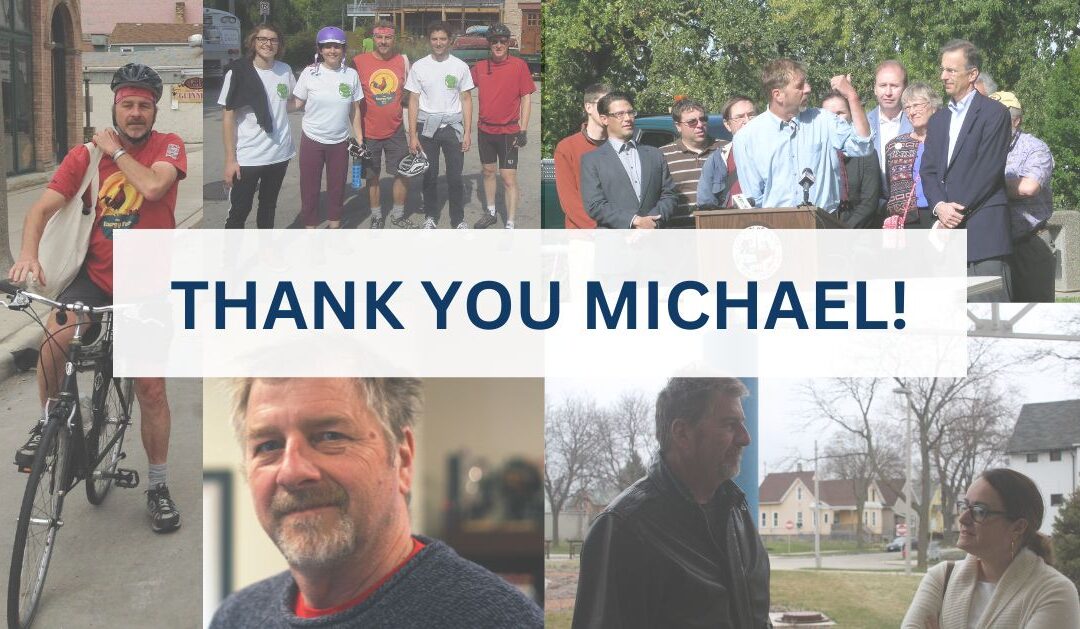
by Alex Beld | Apr 22, 2024 | Press Release, RENEW Wisconsin
After a long career at RENEW Wisconsin, advocating for renewable energy across the state, Michael Vickerman has announced his retirement effective April 20, 2024. Vickerman’s professional legacy spans over 33 years and demonstrates his tireless commitment to Wisconsin’s clean energy transition.
Vickerman got his start at RENEW after responding to a classified ad for a limited-term program coordinator at the nonprofit. For eight years, he served as the sole employee of the organization. He was pivotal in shaping renewable energy policy and fostering collaboration among industry stakeholders.
“No individual has done more to advance renewable energy in the Badger state than Michael Vickerman,” said Sam Dunaiski, Executive Director of RENEW Wisconsin. “He has ushered advocates and professionals through every Wisconsin clean energy challenge and success over the past thirty years. His knowledge, patience, humor, and guidance are unmatched and will be missed at RENEW.”
During his three-decade stint with RENEW, Vickerman held several positions within the organization, serving as Executive Director, Program and Policy Director, and most recently, Clean Energy Deployment Manager.
“Though we’ve had our ups and downs, renewable energy continues to grow in ways that benefit farmers, businesses, communities, and taxpayers,” Vickerman said. “During the early years, it would not have been possible to foresee a future when every power plant in Wisconsin energized in one year would be powered by sunshine and wind energy. But that’s exactly what happened in 2023. Would that have been possible without RENEW’s advocacy over the years and decades? I doubt it.”
“As RENEW has expanded from a single employee to a 13-person staff, our ability to influence and shape state energy policy continues to grow,” Vickerman said. “It will be sad to part company with such a talented group of colleagues, but I have every confidence in their capacity to meet the challenges that lie ahead.”
Vickerman will remain connected to the nonprofit as a member of the board of directors. In his new-found free time, he plans to raise a new puppy with his wife Pamela, garden, and ride his bike around Madison while sustaining his connection to Wisconsin’s renewable energy community.
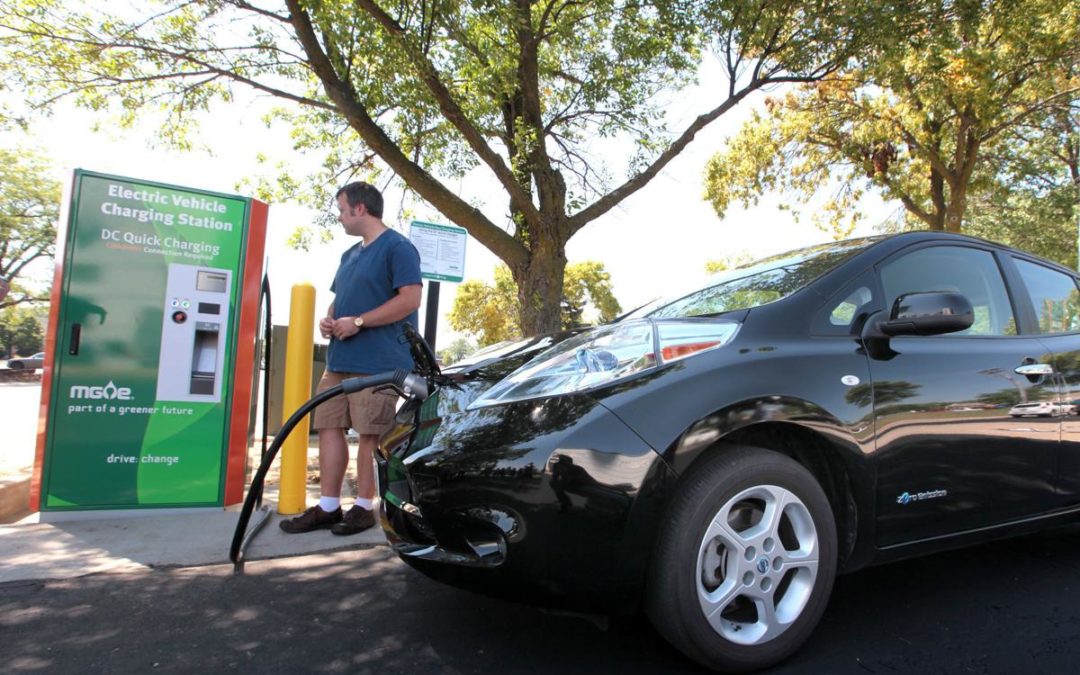
by Orrie Walsvik | Mar 14, 2024 | Electric Vehicles, Electrification, NEVI, RENEW Wisconsin
On March 12, 2024, the Wisconsin State Senate passed Bills 791 and 792, allowing electric vehicle (EV) charging stations to charge by unit of electricity instead of time spent charging. The bill helps provide clean energy access to all Wisconsinites and is a testament to Wisconsin’s commitment to embracing new, proven clean energy technologies. The new law addresses several critical areas to standardize EV usage and infrastructure deployment for private developers. Let’s dive into some of the key parts.
NEVI Funding Unleashed
The cornerstone of the bill is the activation of National Electric Vehicle Infrastructure (NEVI) funding for “Level 3” fast chargers. This funding, totaling a substantial $78 million of federal dollars for Wisconsin, will be channeled toward the building, operation, and maintenance of fast-charging stations across the state. These fast chargers, capable of significantly reducing charging times for longer trips, are vital for reducing range anxiety.
Charging All Over the State, Not Just in Cities
NEVI funding also avoids putting the cart before the horse by providing charging stations across the state, along highway routes for the next five years, paying for the cost of the station, the operations, and the maintenance. Check out the map below to see the routes.
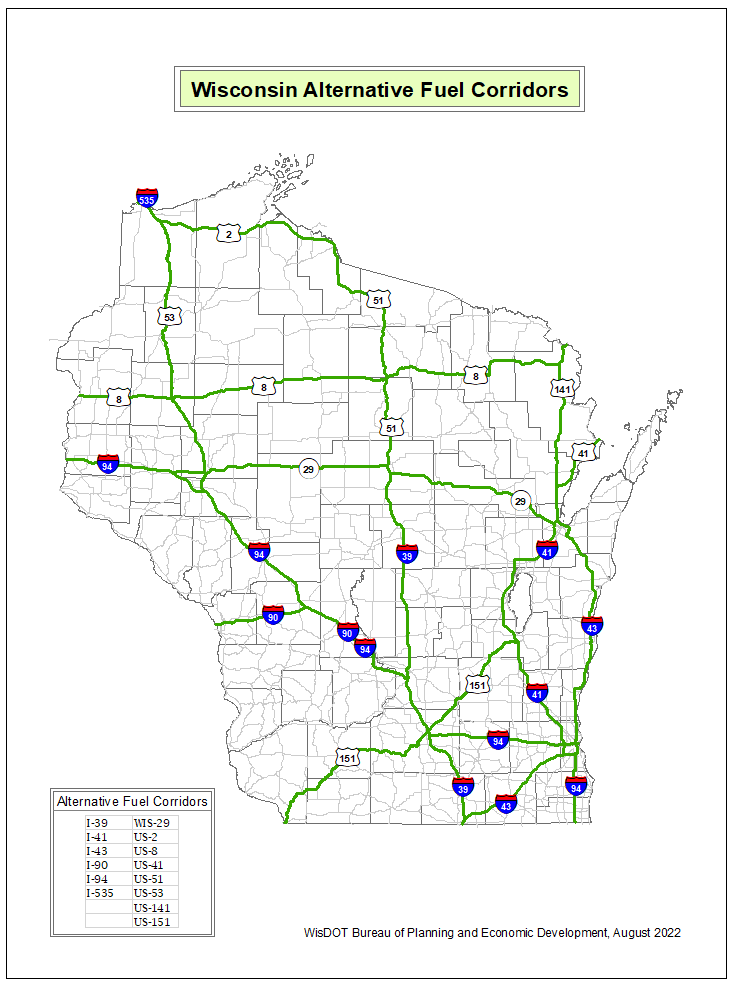
Jobs, Training, Reliability & Safety
But the bill doesn’t stop there. It also emphasizes the importance of training, ensuring that those responsible for these chargers are equipped with the skills necessary to maintain their reliability and safety. Chargers must be operable at least 97% of the time to receive the funding. This commitment to training not only boosts job opportunities but also ensures that the infrastructure remains robust and dependable.
Protects Level 1 and Level 2 Chargers
The Legislation clarifies that residential Level 1 and Level 2 chargers are clear of tax and regulation. It also provides regulatory certainty for groups looking to install public level 1 and level 2 chargers to avoid classification as a public utility, clearing up a large regulatory hurdle for EV Charging implementation. This protection ensures that these residential and light commercial chargers have a realistic path forward in Wisconsin. This move is a win for EV owners and businesses alike, fostering a more flexible and user-friendly charging landscape.
Tax and Road Fund
A tax, similar to the gas tax, of 3 cents per kilowatt-hour (kWh) of electricity used for charging will be implemented for public EV chargers. This measure brings EVs in line with gas and diesel cars. Charging by the kWh also ensures customers pay for the amount of fuel received instead of the amount of time spent charging, a policy that favored individuals with more expensive cars. Now, all users will pay a fair price for their power and end the inequity of time-based charging. Unfortunately, EVs are still required to pay $175 for registration, $75 more than fossil fuel cars.
This bill pairs regulatory certainty for charging station owners with equitable locations and rates for EV drivers. The bill also clarifies how and when local governments can own EV charging stations, and does not effectively change the situations of previously existing chargers.


